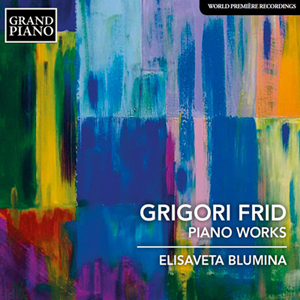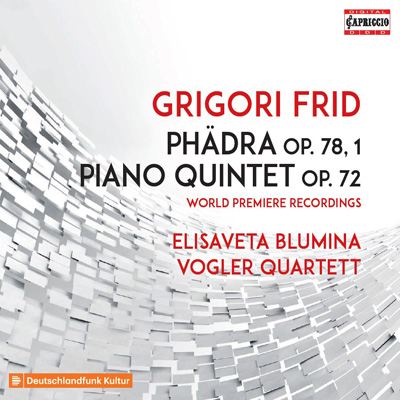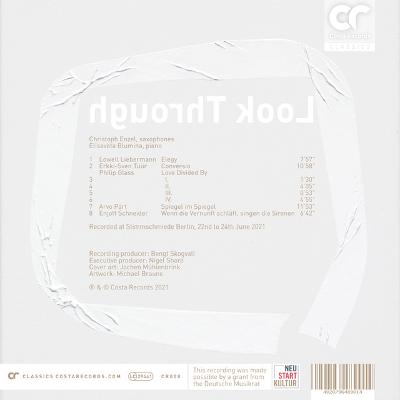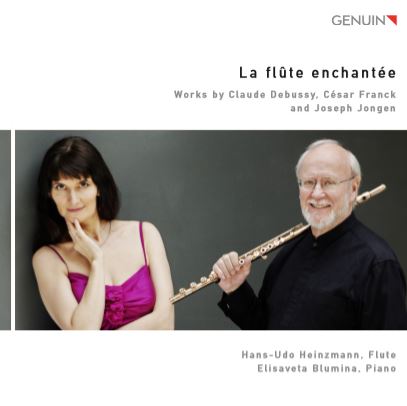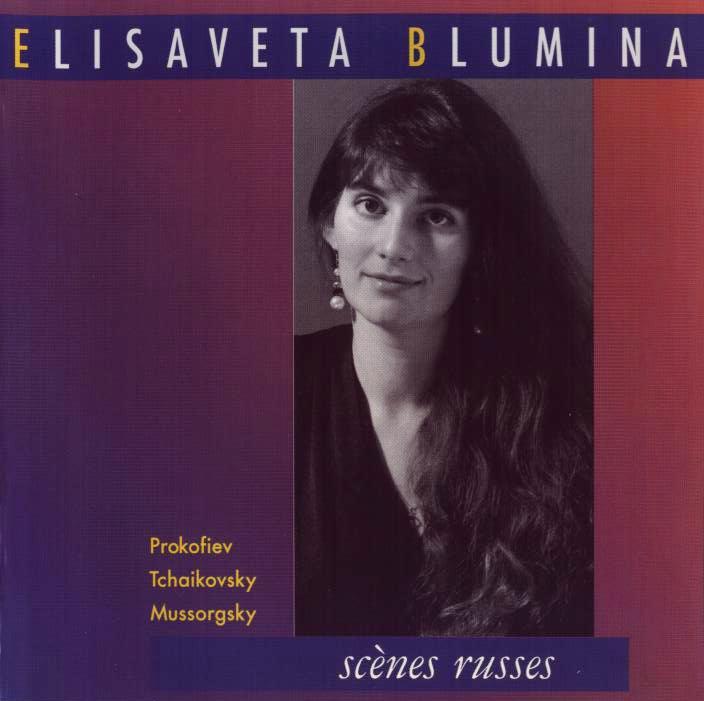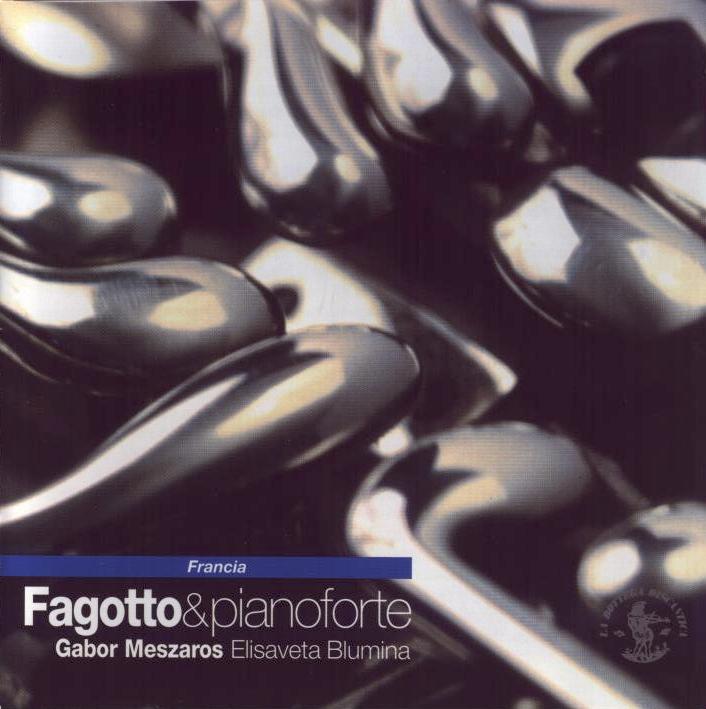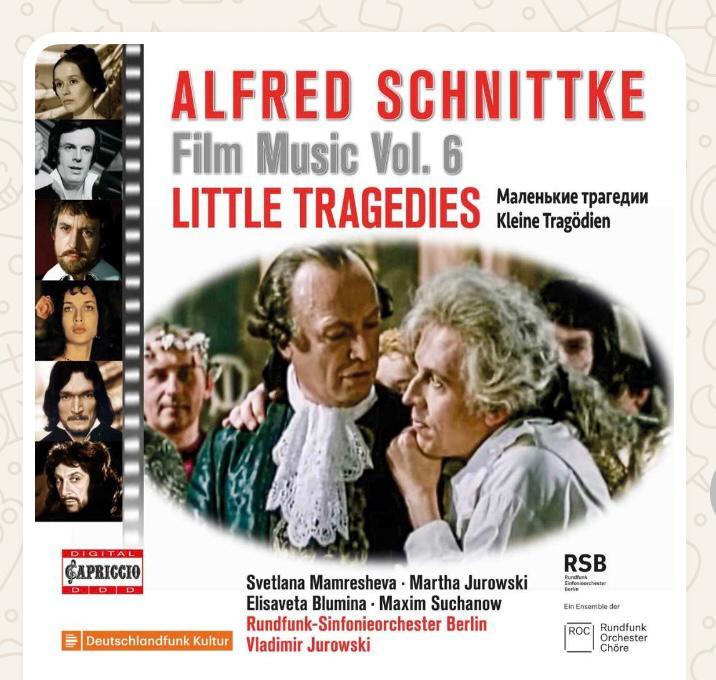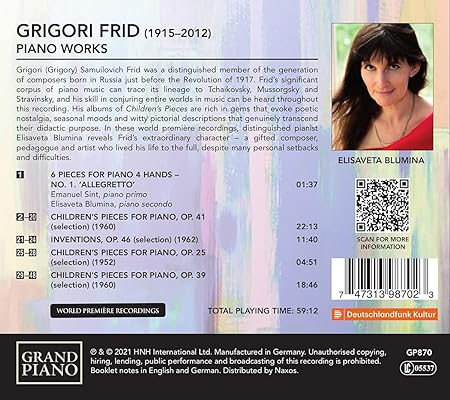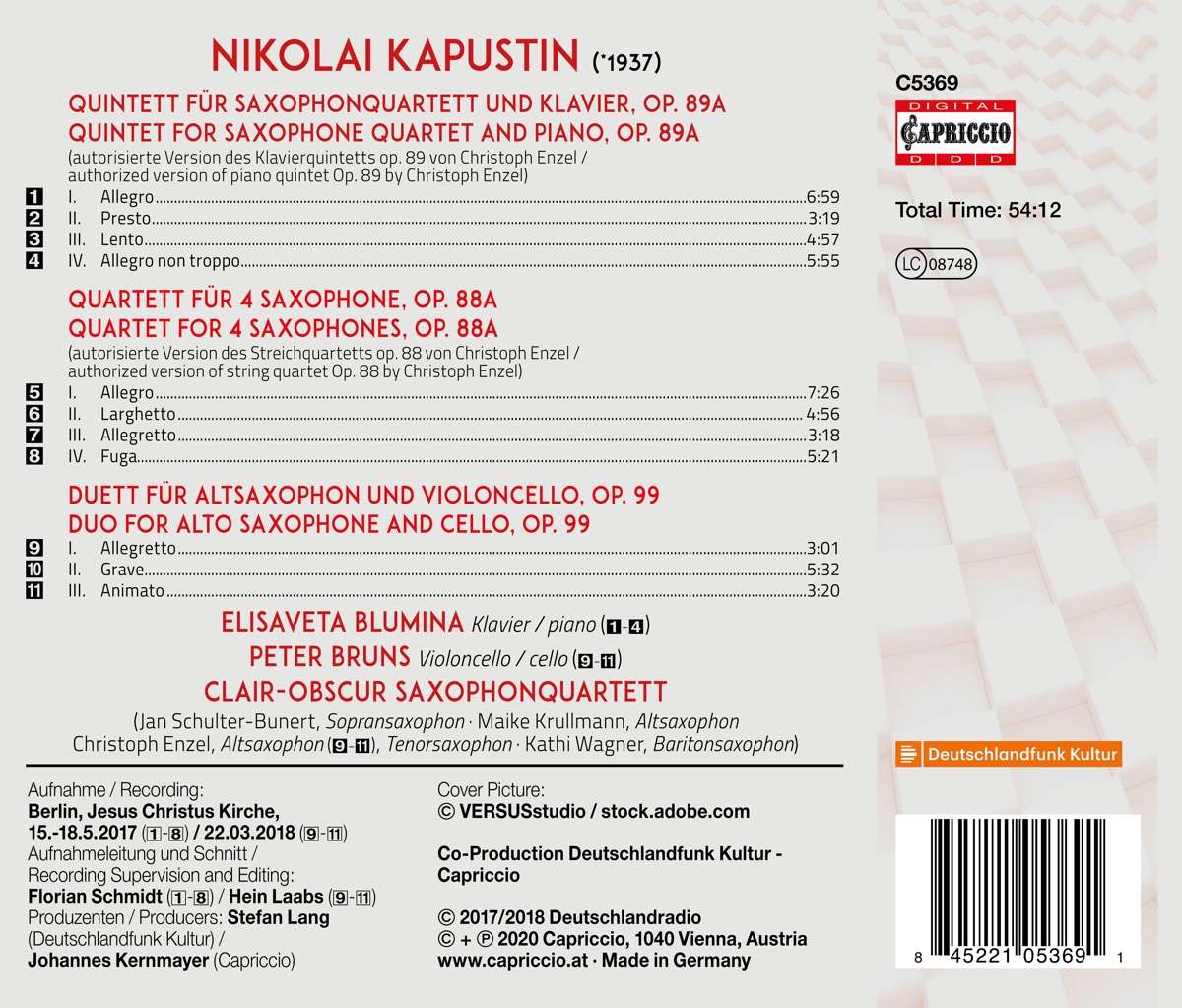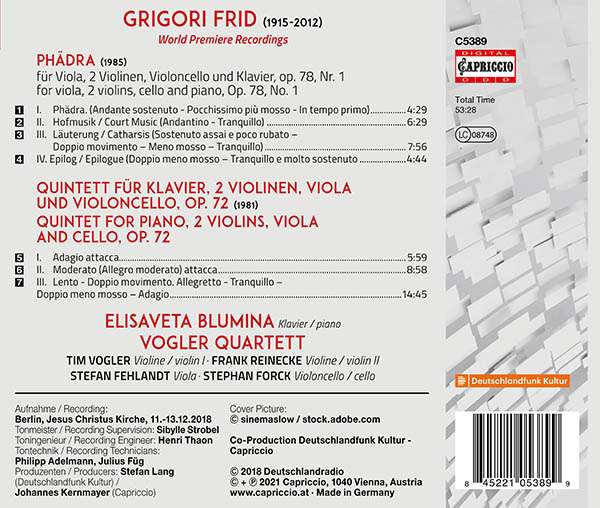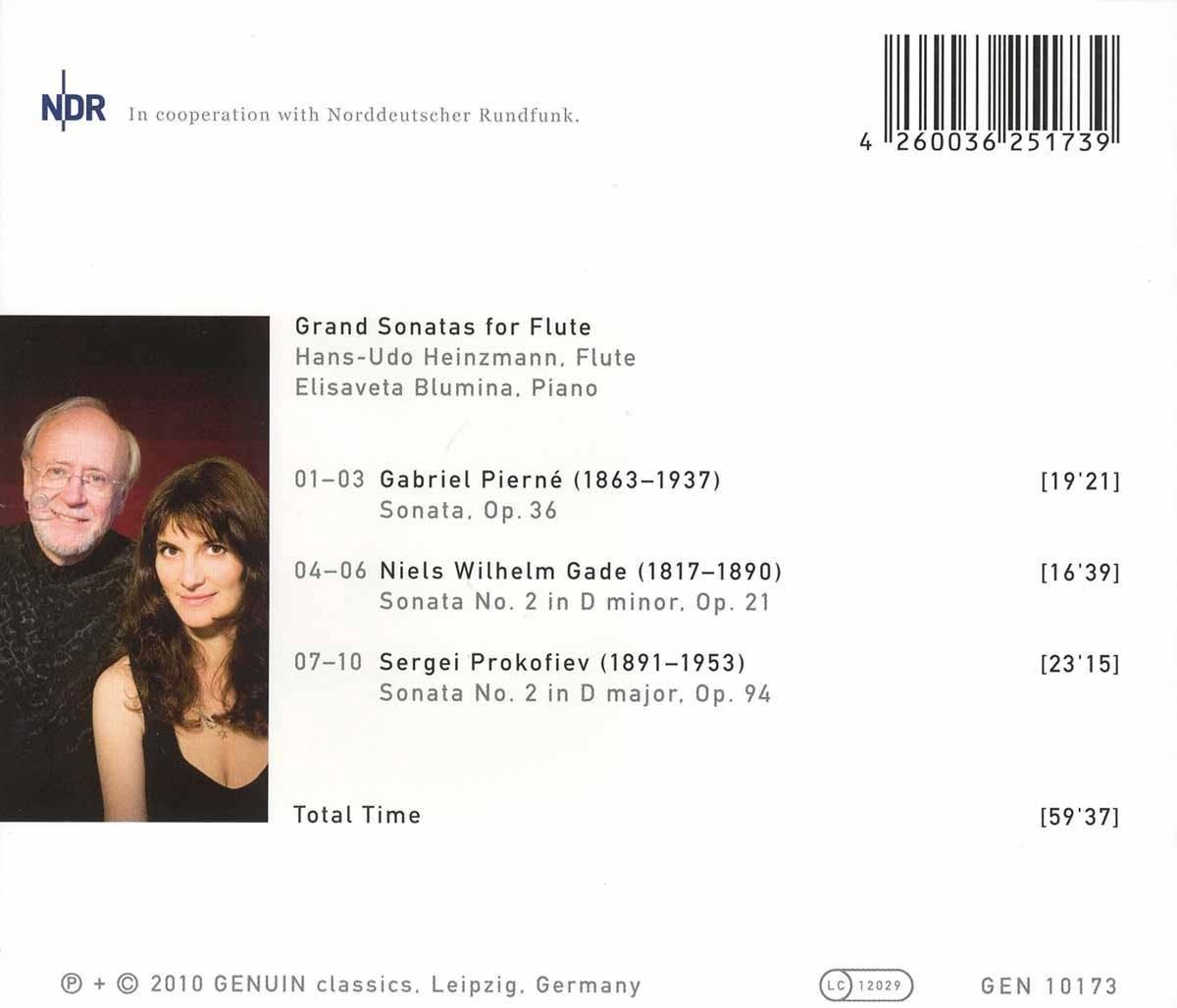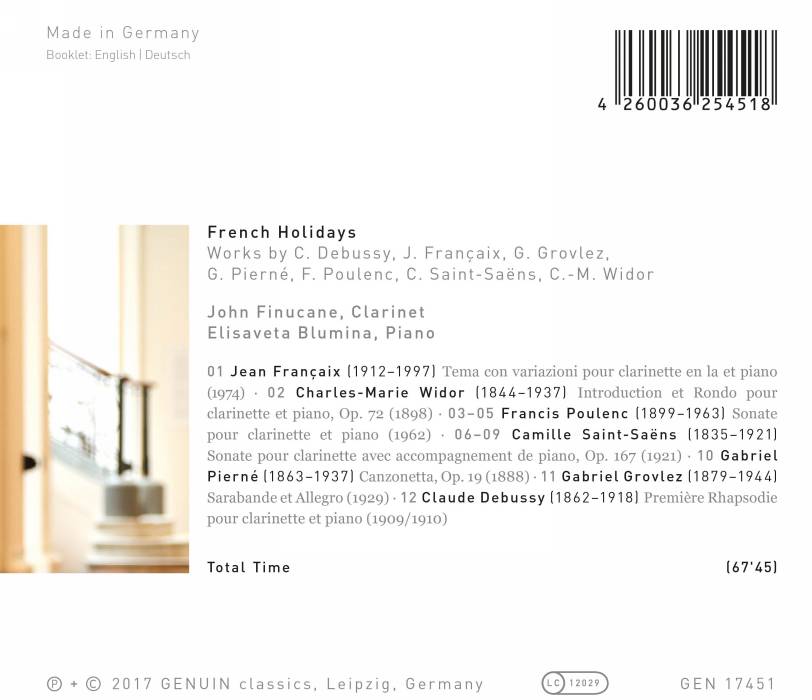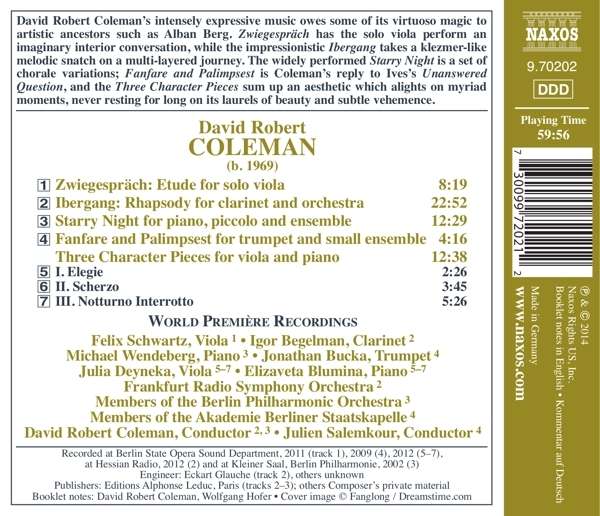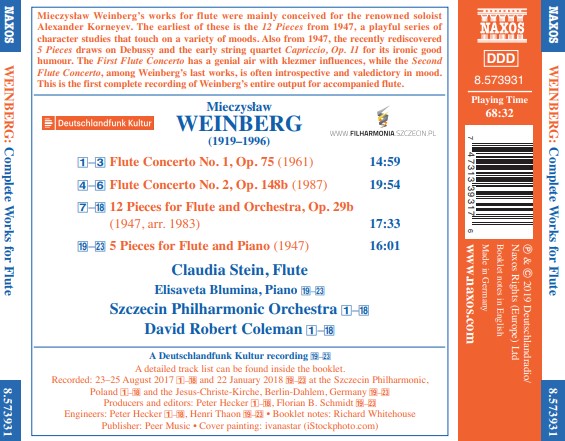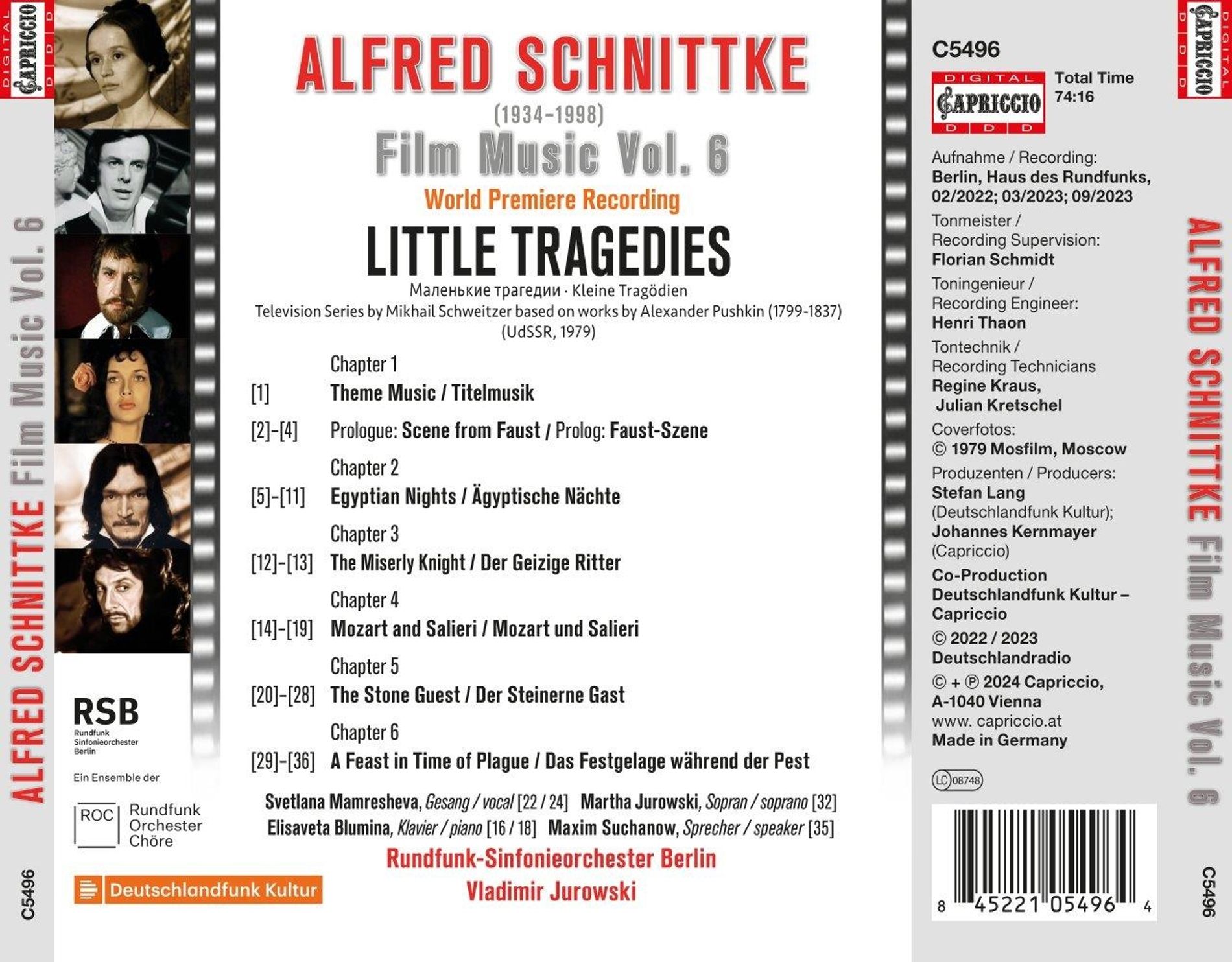 (tap on cover for more!)
(tap on cover for more!)
discs |
interview |
youtube |
||
 (tap on cover for more!)
(tap on cover for more!)

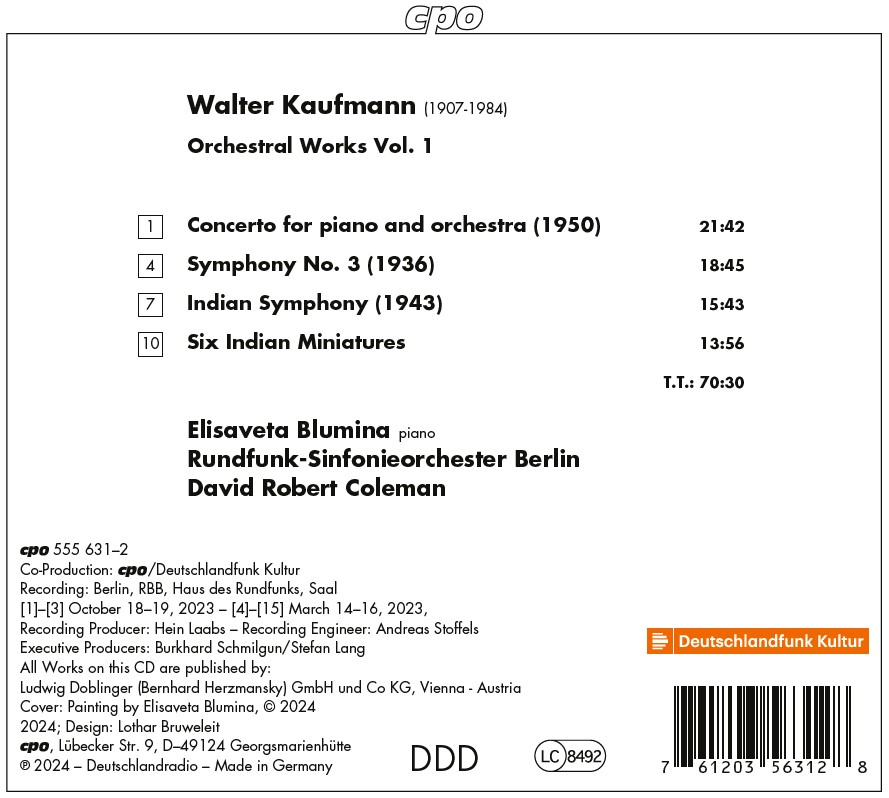
"Elisaveta Blumina begeistert zum einen auf Grund ihrer perlenden Eleganz in der Ausformung der rhythmischen Passagen und ihres dramatisch, packenden Zugriffs auf dieses Werk. Hinzukommen grandiose dynamische Abstufungen. Herrlich... Eine CD die von der ersten bis zur letzten Note einfach nur begeistert!" Sven Godenrath (read more on: "svens opernparadies")
"The booklet notes point out that Elisaveta Blumina is a painter as well as an accomplished pianist. "When making music, she therefore always has colours in mind, and she experiences tonal harmonies or dissonances as colours...." One of her boldly colourful paintings adorns the cover of this CD. For a different perspective on her superlative pianism, I would strongly recommend you give this 2021 Johann Sebastian Bach recording a listen. Once your ears and mind attune to Kaufmann's somewhat unique style there is much to enjoy within his music.“ Jean-Yves Duperron (read more on: "classicalmusicsentinel.com")
"Die Pianistin Elisaveta Blumina stürzt sich in jeden unbekannten Klangdschungel. Und kehrt glücklichmachend zurück!" Elmar Krekeler (read more on: "welt.de/kultur")
"Elisaveta Blumina, Expertin für die Musik jüdischer Komponisten aus der Mitte des 20. Jahrhunderts, wirft sich leidenschaftlich in den anspruchsvollen Klavierpart, arbeitet vor allem im 2. Satz das melancholische Thema in aller Schönheit, aber auch Traurigkeit sanft heraus. Kontrastreich und zupackend hingegen ist ihre Interpretation der beiden Ecksätze. Gern hätte man ihr und dem adäquat begleitenden Rundfunk-Sinfonieorchester Berlin unter David Robert Coleman länger zugehört. Aber das gesamte Konzert dauert nur knapp 22 Minuten..." Regina Ströbl (read more on: "klassik-begeistert.de")
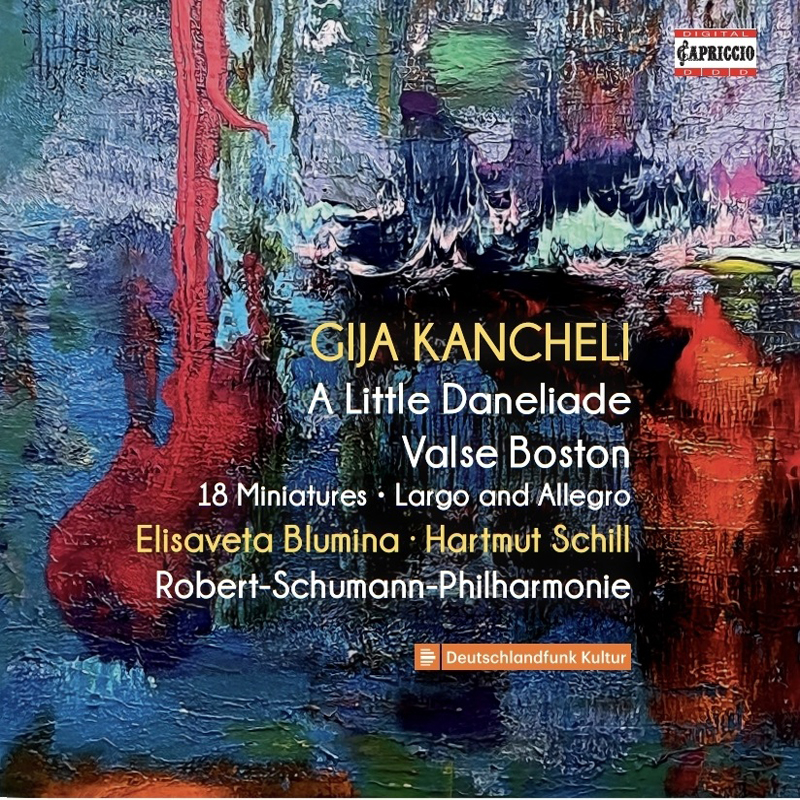
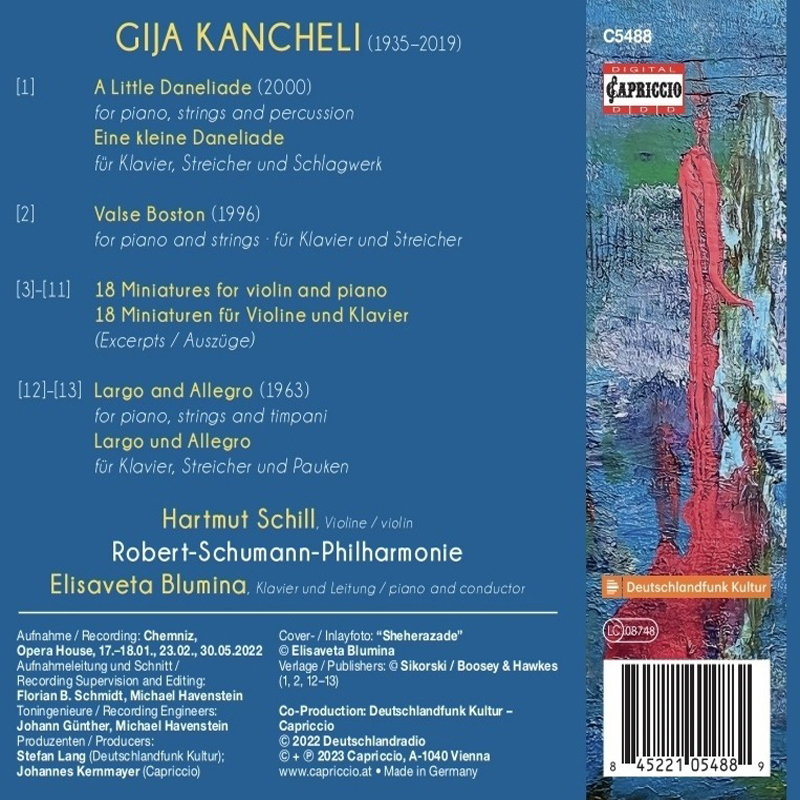
"Blumina conducts as she plays, with a combination of elegance and power, enhancing this relatively simple piece to a level, if not the highest art, at least artistic in a way that is very intriguing." Lynn René Bayley (read more on: "the art music lounge")

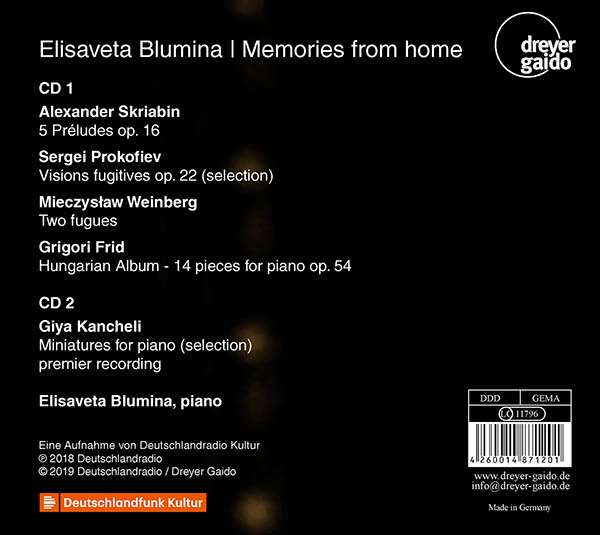
"Elisaveta Blumina ist eine Künstlerin, die man als 'Hidden champion' bezeichnen könnte, sie ist in vielen Konzertsälen der Welt zu Hause, hat in Hamburg auch ein eigenes Kammermusikfestival - und sie hat sich sehr verdient gemacht um Klaviermusik der klassischen Moderne. Vor allem für Werke von russischen und osteuropäischen Komponisten, die hierzulande noch nicht so präsent sind, teils auch, weil die Nationalsozialisten sie verfemt hatten. Der Titel des Albums "Memories from Home" verweist darauf, dass Elisaveta Blumina in Russland aufgewachsen ist, sie hat in Sankt Petersburg studiert und deswegen sind natürlich Komponisten wie Skriabin, Prokofjew oder Mieczyslaw Weinberg (ein Freund und Kollege von Dmitri Schostakowitsch) ganz wichtig. Weinbergs Klaviermusik hat sie eigentlich im Konzertsaal etabliert. Und all diese Komponisten bringt sie dem Publikum in ihrer jetzigen Heimat Deutschland nahe. Und diese Doppel-CD eignet sich als Einstieg, denn sie enthält jede Menge Miniaturen, also sehr kurze Klavierstücke, keines länger als zweieinhalb Minuten..." Claus Fischer (MDR Kultur)
 "Die in St. Petersburg geborene Pianistin Elisaveta Blumina hat sich einen Namen gemacht als große musikalische Kämpferin für vergessene Musik. Dies macht sich auch auf ihrem neuen Album „Memories from home“ bemerkbar..." Verena Düren (read more on "klassik-heute.de")
"Die in St. Petersburg geborene Pianistin Elisaveta Blumina hat sich einen Namen gemacht als große musikalische Kämpferin für vergessene Musik. Dies macht sich auch auf ihrem neuen Album „Memories from home“ bemerkbar..." Verena Düren (read more on "klassik-heute.de")
"Blumina brings something out... that other pianists do not: a certain wistful, bittersweet sadness.." Lynn René Bayley (read more on: "the art music lounge")
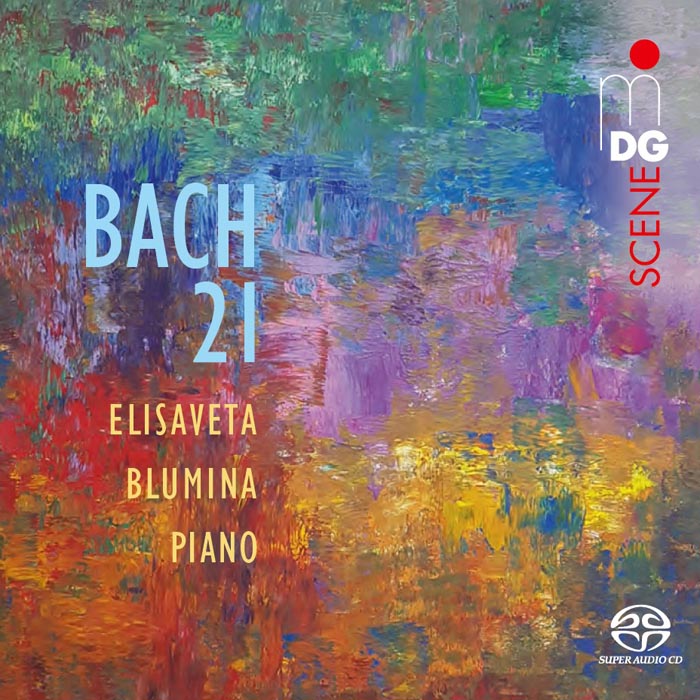
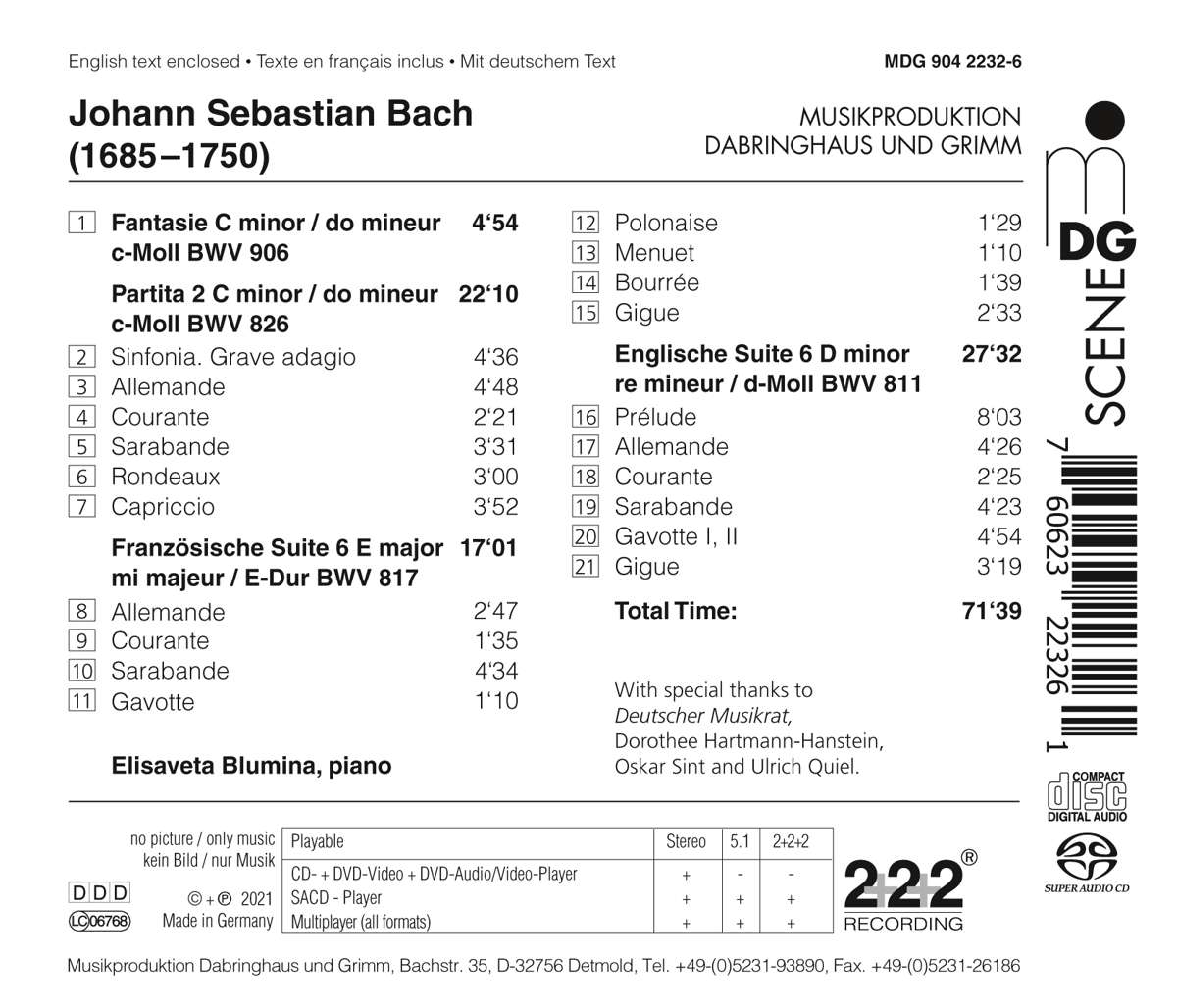
 "Most of German concert pianist Elisaveta Blumina's recording output has been focused on the music of 20th and 21st century predominantly Russian composers like Ustvolskaya, Shostakovich and Prokofiev. And she is now in the process of recording all of Mieczyslaw Weinberg's complete piano music, so one could assume that her interpretation of the brightly colored keyboard music of Johann Sebastian Bach may be slightly tainted by Soviet shadows. Quite the contrary ... the incisive energy she brings to the Fantasia in C minor is certainly an ear opener. Most noticeable is the flawless interaction between the right and left hand. Rather than one leading the other, the perfect balance between the two sounds like a couple dancing together in seamless unison. There's almost a twirling effect to her phrasing making it impossible to determine when one hand ends and the other one begins." Jean-Yves Duperron (read more on: "Classical Music Sentinel")
"Most of German concert pianist Elisaveta Blumina's recording output has been focused on the music of 20th and 21st century predominantly Russian composers like Ustvolskaya, Shostakovich and Prokofiev. And she is now in the process of recording all of Mieczyslaw Weinberg's complete piano music, so one could assume that her interpretation of the brightly colored keyboard music of Johann Sebastian Bach may be slightly tainted by Soviet shadows. Quite the contrary ... the incisive energy she brings to the Fantasia in C minor is certainly an ear opener. Most noticeable is the flawless interaction between the right and left hand. Rather than one leading the other, the perfect balance between the two sounds like a couple dancing together in seamless unison. There's almost a twirling effect to her phrasing making it impossible to determine when one hand ends and the other one begins." Jean-Yves Duperron (read more on: "Classical Music Sentinel")
 "A very personal take on Bach, then. Unless you share Blumina’s synesthesia, the associations and contrasts that she discusses might pass you by. But, by including her own paintings, we are offered a glimpse of how this inspires her interpretations. Attractive, vivacious playing, captured in excellent sound, and with impressive production values all round." Gavin Dixon ("Classical CD Reviews")
"A very personal take on Bach, then. Unless you share Blumina’s synesthesia, the associations and contrasts that she discusses might pass you by. But, by including her own paintings, we are offered a glimpse of how this inspires her interpretations. Attractive, vivacious playing, captured in excellent sound, and with impressive production values all round." Gavin Dixon ("Classical CD Reviews")

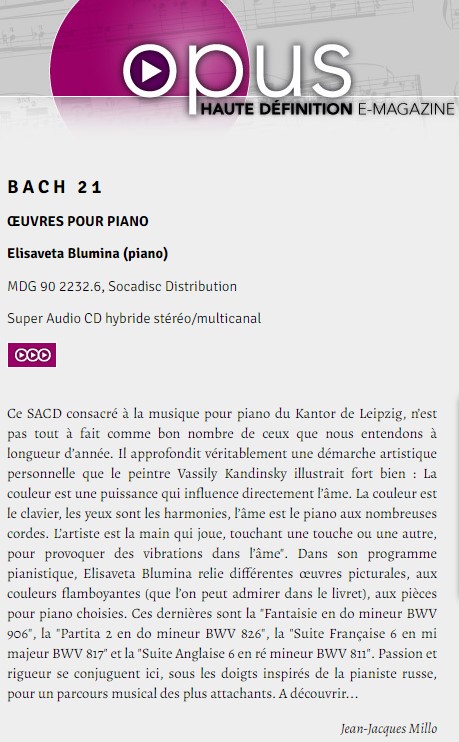


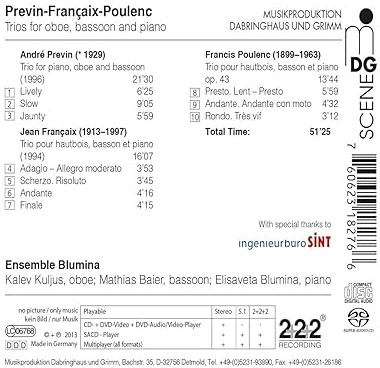
 "Hervorragendes Amusement und haarsträubende Fingerakrobatik... da ist beste Unterhaltung auf allerhöchstem Niveau garantiert! Dazu kommt eine hervorragende Akustik, die die Instrumente im kristallinen SACD-Klang perfekt umhüllt. Beste Voraussetzungen für quirlige Vergnüglichkeit." Lisa Eranos ("class:aktuell")
"Hervorragendes Amusement und haarsträubende Fingerakrobatik... da ist beste Unterhaltung auf allerhöchstem Niveau garantiert! Dazu kommt eine hervorragende Akustik, die die Instrumente im kristallinen SACD-Klang perfekt umhüllt. Beste Voraussetzungen für quirlige Vergnüglichkeit." Lisa Eranos ("class:aktuell")
 "Eigenwilliger Dreier: Oboe, Fagott und Klavier... Durch und durch französische Charakterstücke und eine wahre Liebeserklärung an das Doppelrohr." Katja de Rollé (WDR)
"Eigenwilliger Dreier: Oboe, Fagott und Klavier... Durch und durch französische Charakterstücke und eine wahre Liebeserklärung an das Doppelrohr." Katja de Rollé (WDR)
 "Die drei Interpreten werden den stilistisch nur teilweise verwandten Aufgaben gut gerecht. Der Oboist Kalev Kuljus und der Fagottist Mathias Baier spielen klangschön, ohne tonliche Schärfen und mit bewusst differenziertem Vibrato, in Intonation und artikulatorischer Übereinstimmung tadellos. Die Pianistin Elisaveta Blumina schafft sowohl in rhythmisch und dynamisch erregten Partien (Previn) wie in klanglich betonten Ruhephasen (Poulenc) ein ideales Umfeld für die Bläser. Der Aufnahmetechnik gelingt eine hervorragende Balance zwischen plastischem und homogenem Klangbild." Rainer Klaas ("Das Orchester")
"Die drei Interpreten werden den stilistisch nur teilweise verwandten Aufgaben gut gerecht. Der Oboist Kalev Kuljus und der Fagottist Mathias Baier spielen klangschön, ohne tonliche Schärfen und mit bewusst differenziertem Vibrato, in Intonation und artikulatorischer Übereinstimmung tadellos. Die Pianistin Elisaveta Blumina schafft sowohl in rhythmisch und dynamisch erregten Partien (Previn) wie in klanglich betonten Ruhephasen (Poulenc) ein ideales Umfeld für die Bläser. Der Aufnahmetechnik gelingt eine hervorragende Balance zwischen plastischem und homogenem Klangbild." Rainer Klaas ("Das Orchester")
 "Die drei Musiker sind perfekt aufeinander abgestimmt, was sich gerade in den rhythmisch vertrackten Sätzen des Previn-Trios zeigt. Das ironische Pathos bei Françaix und vor allem bei Poulenc nehmen sie mit dem rechten Maß auf, ohne zu übertreiben oder zu verkitschen. Ruhige Kantilenen der Bläser, etwa im Mittelsatz des Poulenc-Trios, werden klangschön und mit viel Ruhe dargeboten, insgesamt herrscht ein sehr angenehmer klanglicher Ausgleich. Paradestücke sind allerdings die schnellen Françaix- und Poulencsätze, in denen es zwischen den drei Instrumenten wunderbar glitzert und funkelt. Bernhard Schrammek (RBBkulturradio)
"Die drei Musiker sind perfekt aufeinander abgestimmt, was sich gerade in den rhythmisch vertrackten Sätzen des Previn-Trios zeigt. Das ironische Pathos bei Françaix und vor allem bei Poulenc nehmen sie mit dem rechten Maß auf, ohne zu übertreiben oder zu verkitschen. Ruhige Kantilenen der Bläser, etwa im Mittelsatz des Poulenc-Trios, werden klangschön und mit viel Ruhe dargeboten, insgesamt herrscht ein sehr angenehmer klanglicher Ausgleich. Paradestücke sind allerdings die schnellen Françaix- und Poulencsätze, in denen es zwischen den drei Instrumenten wunderbar glitzert und funkelt. Bernhard Schrammek (RBBkulturradio)


With two world première recordings, this programme highlights the Romantic and spiritual side of contemporary music from Russia and Eastern Europe. Galina Ustvolskaya’s early Concerto expresses a vision of beauty and suffering in a tonal language quite unlike her later works. Giya Kancheli’s Sio or ‘breeze’ is notable for its striking use of silence, as well as modal tunes, bass drones and wide dynamic extremes derived from Georgian folk music. Silvestrov’s devotional Hymn reflects his approach to music as “a song the world sings about itself”.
 "Elisaveta Blumina liebt die Nische. Die im sowjetischen Leningrad geborene, nach Hamburg ausgewanderte und heute in Berlin lebende Pianistin ist eine Anwältin des Ungehörten. So war die Wiederentdeckung von Mieczyslaw Weinberg auch ihr Verdienst, und jetzt Grigori Frid. Im Jahr 2012 fast 100-jährig in Moskau verstorben, sind viele Mitglieder seiner Familie der Diktatur Stalins zum Opfer gefallen. In Moskau führte er heimlich Werke angefeindeter Komponisten auf: von Sofia Gubaidulina, Edison Denissow oder Alfred Schnittke. Hierzulande ist vor allem seine Mono-Oper "Tagebuch der Anne Frank" bekannt. Für ihr Frid-Porträt hat Blumina durchwegs Ersteinspielungen realisiert. Sie zeigen, wie sehr die Klaviermusik Dmitri Schostakowitschs ein zentrales Vorbild ist. So wirken die "Inventionen" Op.46 wie eine Reflexion des Zyklus Op.87 Schostakowitschs. Gleichzeitig scheinen manche Polkas, Galopps und Märsche aus den "Kinderstücken" frühen oder pädagogischen Werken Schostakowitschs wie die "Puppentänze" entsprungen (auffallend der Mittelteil im "Traurigen Lied" Nr.4 aus Op.39). Die eingespielten Werke repräsentieren nicht den kühnen Modernisten Frid, aber: Im feinen, differenzierten Spiel Bluminas wird der Humor genauso deutlich wie die atmosphärisch dichten Stimmungsbilder. Blumina ist eine Fabuliererin im allerbesten Sinn, und man hört ihr sehr gerne zu." Marco Frei ("Pianonews")
"Elisaveta Blumina liebt die Nische. Die im sowjetischen Leningrad geborene, nach Hamburg ausgewanderte und heute in Berlin lebende Pianistin ist eine Anwältin des Ungehörten. So war die Wiederentdeckung von Mieczyslaw Weinberg auch ihr Verdienst, und jetzt Grigori Frid. Im Jahr 2012 fast 100-jährig in Moskau verstorben, sind viele Mitglieder seiner Familie der Diktatur Stalins zum Opfer gefallen. In Moskau führte er heimlich Werke angefeindeter Komponisten auf: von Sofia Gubaidulina, Edison Denissow oder Alfred Schnittke. Hierzulande ist vor allem seine Mono-Oper "Tagebuch der Anne Frank" bekannt. Für ihr Frid-Porträt hat Blumina durchwegs Ersteinspielungen realisiert. Sie zeigen, wie sehr die Klaviermusik Dmitri Schostakowitschs ein zentrales Vorbild ist. So wirken die "Inventionen" Op.46 wie eine Reflexion des Zyklus Op.87 Schostakowitschs. Gleichzeitig scheinen manche Polkas, Galopps und Märsche aus den "Kinderstücken" frühen oder pädagogischen Werken Schostakowitschs wie die "Puppentänze" entsprungen (auffallend der Mittelteil im "Traurigen Lied" Nr.4 aus Op.39). Die eingespielten Werke repräsentieren nicht den kühnen Modernisten Frid, aber: Im feinen, differenzierten Spiel Bluminas wird der Humor genauso deutlich wie die atmosphärisch dichten Stimmungsbilder. Blumina ist eine Fabuliererin im allerbesten Sinn, und man hört ihr sehr gerne zu." Marco Frei ("Pianonews")

"And Blumina, who has an enormous technique (I’ve written several reviews of her work on this blog), just lets her hair down and has fun with them. Her joy in playing them is obvious and infectious." Lynn René Bayley (read more on: "the art music lounge")

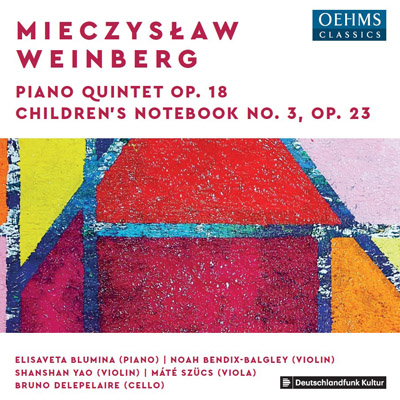
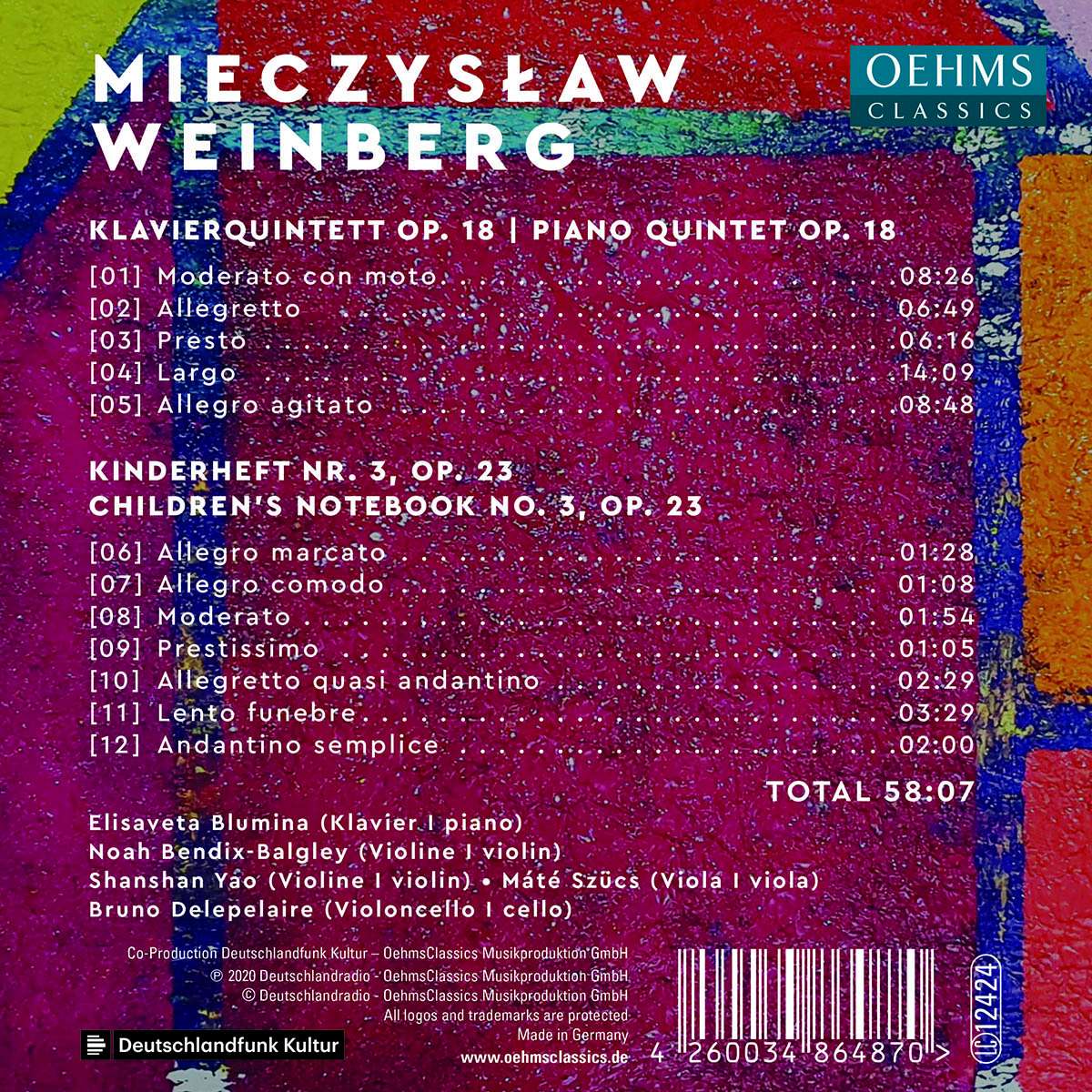
Please note: Elisaveta Blumina has also recorded the Quintet op. 18 in a version for piano and string orchestra on CD!
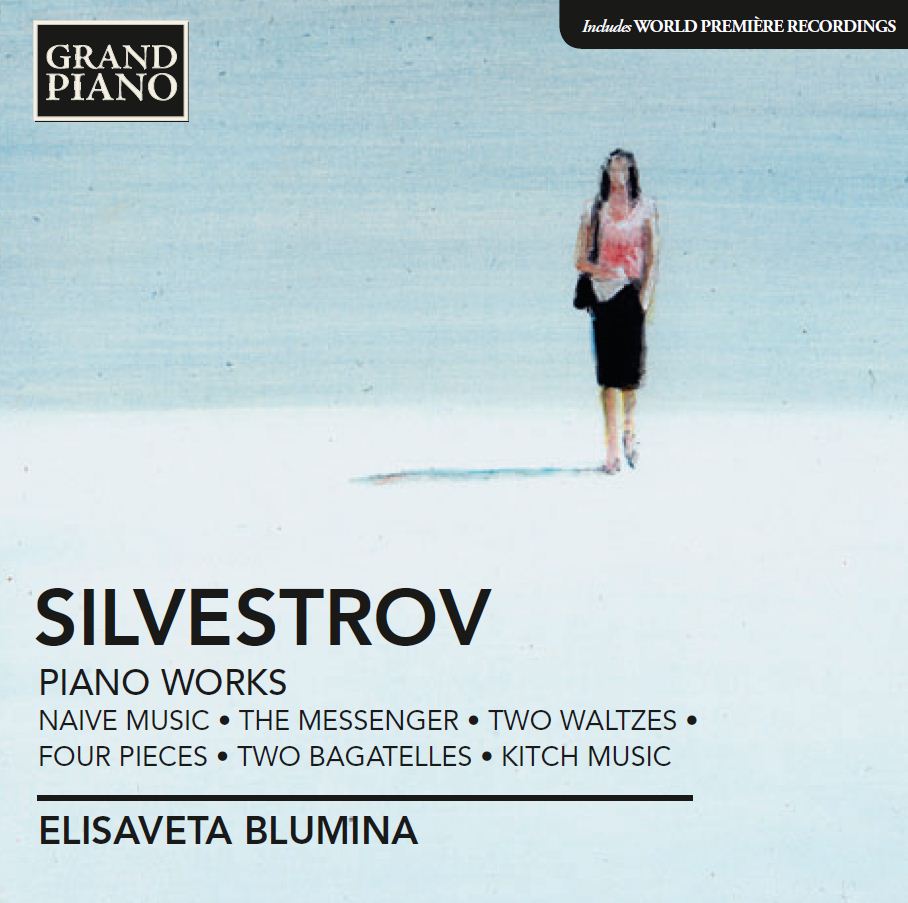

Die Klaviermusik spielt im Schaffen des Ukrainers Valentin Silvestrov eine zentrale Rolle. Die vorliegende CD ist Klavierwerken aus verschiedenen seiner Schaffensperioden gewidmet. In den letzten Jahren, die Silvestrov als „Bagatellen-Periode“ bezeichnet, hat er sich intensiv der Miniatur zugewandt, in denen er „Duette mit der Stille“ sieht, nicht nur die Klänge selbst, sondern auch die „klingenden“ Pausen spielen eine große Rolle. (©"Naxos")

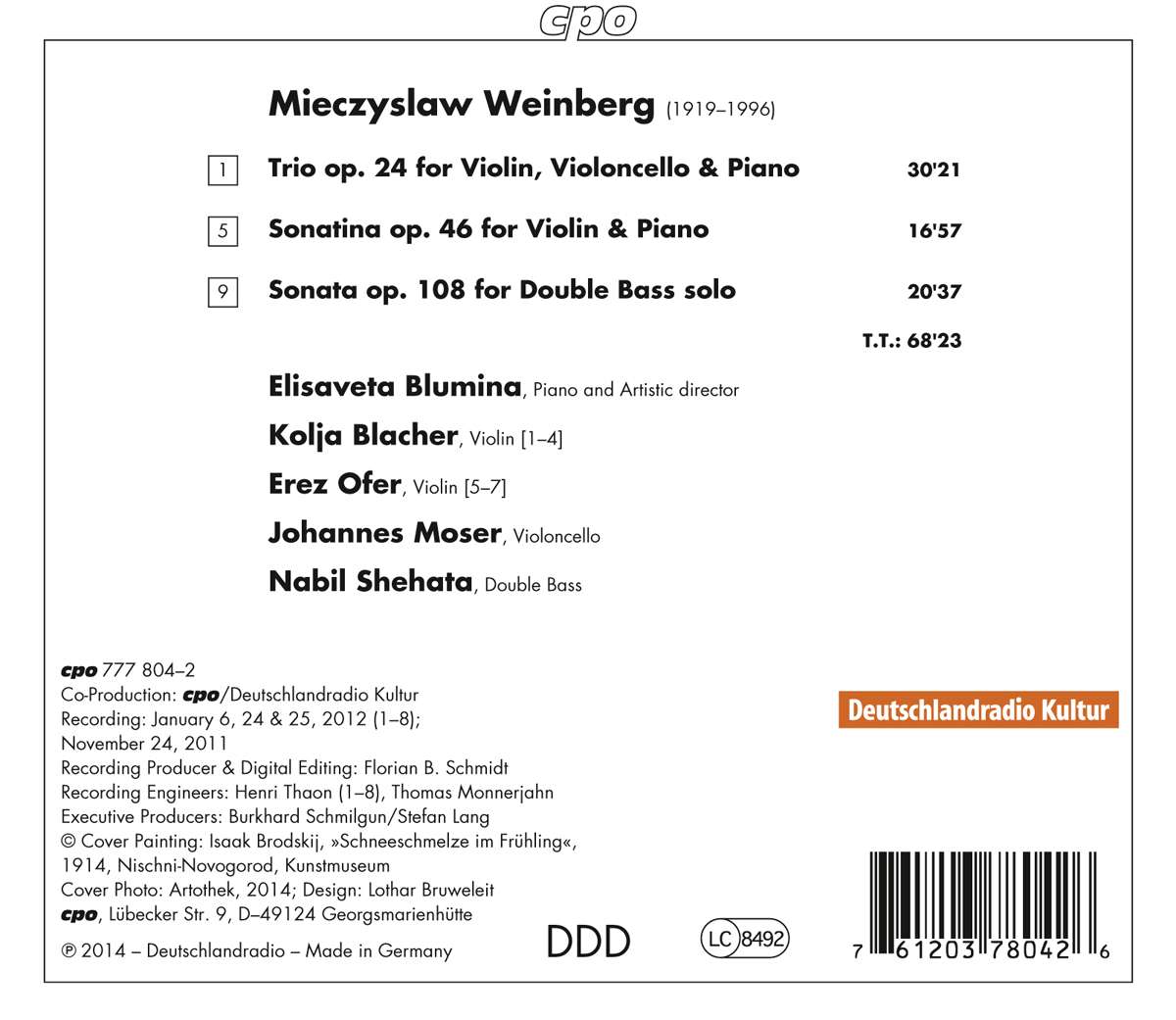
 "Eigenständig, markant, intensiv
"Eigenständig, markant, intensiv
"...gilt für das hochoriginelle Klaviertrio op. 24 (1945), das in einer packenden Interpretation mit Elisaveta Blumina, Kolja Blacher und Johannes Moser bei CPO erschienen ist. Die ausgezeichnete CD enthält außerdem die schöne, unter der gelassenen Oberfläche einige Innenspannung aufweisende Violinsonatine op. 46 (Pianistin Blumina hier im Duo mit dem äußerst sorgfältigen Erez Ofer) und die von Nabil Shehata eindrucksvoll bewältigte, suitenartige Solosonate für Kontrabass." Juan Martin Koch (nmz) (...read more)
 "Mit Weinbergs Klaviertrio op. 24, seiner Sonatine op. 46 und der Sonate op. 108 für Kontrabass solo finden sich auf dieser CD gänzlich unterschiedliche Werke Weinbergs versammelt, die zumindest das überwiegend grandiose Interpretationsniveau vereint." Christian Starke (klassik.com) (...read more)
"Mit Weinbergs Klaviertrio op. 24, seiner Sonatine op. 46 und der Sonate op. 108 für Kontrabass solo finden sich auf dieser CD gänzlich unterschiedliche Werke Weinbergs versammelt, die zumindest das überwiegend grandiose Interpretationsniveau vereint." Christian Starke (klassik.com) (...read more)
 "The three-movement work Weinberg modestly labelled 'sonatina' is more substantial than this title suggests, although it is fairly light in character, bubbling with gentle nostalgia in a rather un-Polish way. The second movement is not at all "very tragic", as the notes state. The score is sensitively interpreted by Erez Ofer and Elisaveta Blumina. Blumina returns for the Piano Trio, Ofer now replaced by Kolja Blacher, the pair joined by German-Canadian cellist Johannes Moser, who recorded Weinberg's Cello Sonata no.2 for Haenssler back in 2006. The Trio is a deeper, more ambiguous work, and no wonder - to say that it was written at a 'difficult time' for the composer would be crass: his parents and sister had been murdered in a concentration camp, but he did not yet know. The tragic hope of the final movement is palpable, beautifully expressed for posterity by the three soloists." Byzantion (musicweb international) (...read more)
"The three-movement work Weinberg modestly labelled 'sonatina' is more substantial than this title suggests, although it is fairly light in character, bubbling with gentle nostalgia in a rather un-Polish way. The second movement is not at all "very tragic", as the notes state. The score is sensitively interpreted by Erez Ofer and Elisaveta Blumina. Blumina returns for the Piano Trio, Ofer now replaced by Kolja Blacher, the pair joined by German-Canadian cellist Johannes Moser, who recorded Weinberg's Cello Sonata no.2 for Haenssler back in 2006. The Trio is a deeper, more ambiguous work, and no wonder - to say that it was written at a 'difficult time' for the composer would be crass: his parents and sister had been murdered in a concentration camp, but he did not yet know. The tragic hope of the final movement is palpable, beautifully expressed for posterity by the three soloists." Byzantion (musicweb international) (...read more)
 "Weinberg’s inventiveness and craftsmanship are such that his music doesn’t suffer by comparison with that of his mentor, Shostakovich. There can hardly be a better demonstration of the capabilities of these musicians than the second movement of the Piano Trio, a fearsome Toccata in 5/16 time, while the grief-stricken third movement, “Poem”, brings a particularly intense performance. All three of these musicians have had a long association with the music of this composer, and it shows in the commitment and concentration of their performance." The Critic's Chair (Radio New Zealand) (...read more)
"Weinberg’s inventiveness and craftsmanship are such that his music doesn’t suffer by comparison with that of his mentor, Shostakovich. There can hardly be a better demonstration of the capabilities of these musicians than the second movement of the Piano Trio, a fearsome Toccata in 5/16 time, while the grief-stricken third movement, “Poem”, brings a particularly intense performance. All three of these musicians have had a long association with the music of this composer, and it shows in the commitment and concentration of their performance." The Critic's Chair (Radio New Zealand) (...read more)
 "The performances are excellent throughout. Pianist and series curator Elisaveta Blumina gives a muscular and focussed lead in the trio and a sensitive accompaniment in the sonatina. The sound engineering is also excellent!" Gavin Dixon (sinfini music)
"The performances are excellent throughout. Pianist and series curator Elisaveta Blumina gives a muscular and focussed lead in the trio and a sensitive accompaniment in the sonatina. The sound engineering is also excellent!" Gavin Dixon (sinfini music)

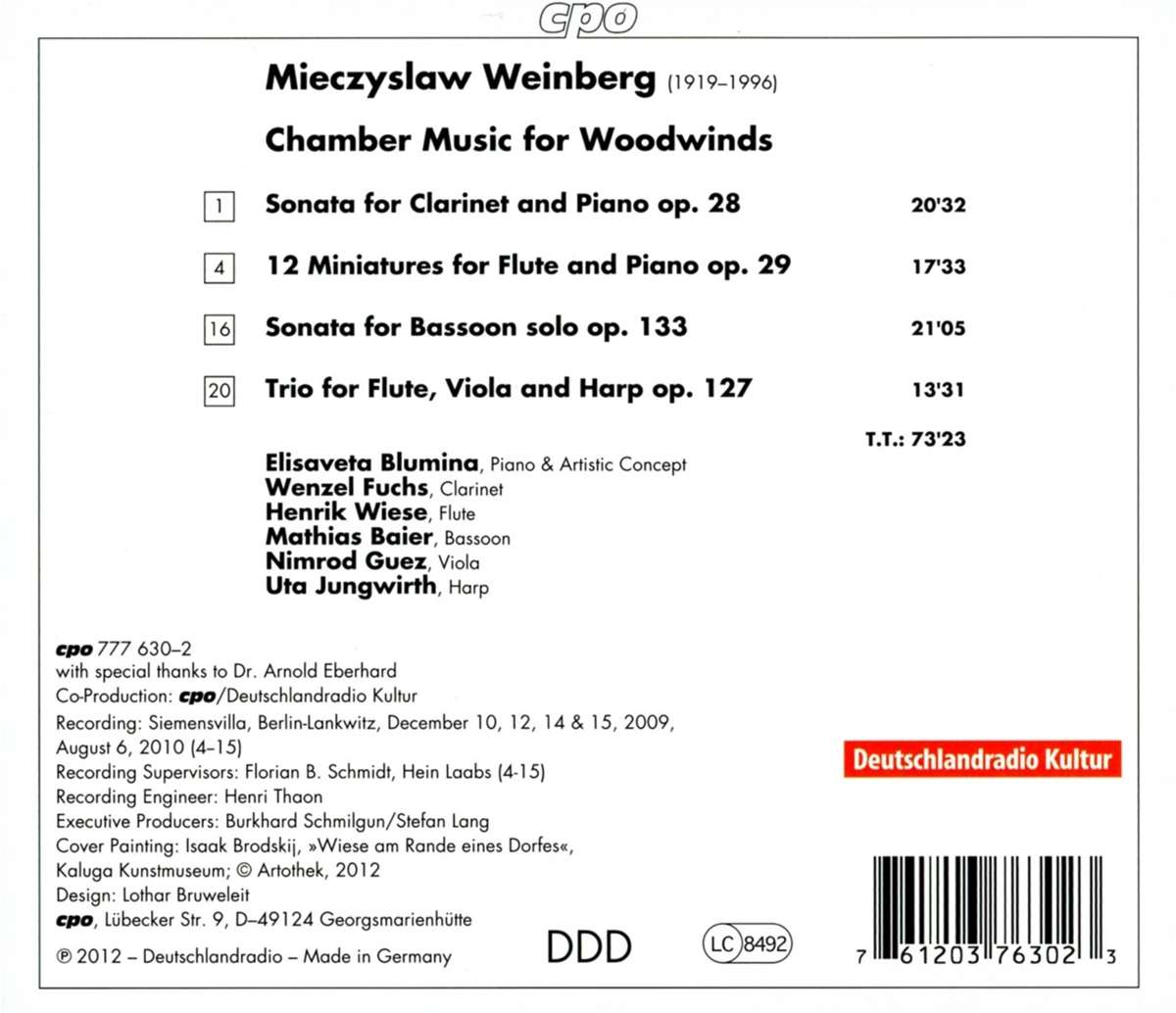
"CD of the Week – A Rush of Mieczyslaw Weinbergs: If ever you need a 20-minute sonata for solo bassoon, it’s here. The rest, nicely curated by the Irish-based pianist Elisaveta Blumina, consists of a clarinet-piano sonata, 12 miniatures for flute and piano and a trio for flute, viola and harp whose textures never fail to astonish. Weinberg had a wonderful ear and a fertile imagination. The playing it top-class. Just listen." (Norman Lebrecht, London)
 "Elisaveta Blumina ist einer hervorragende Kammermusikerin... Entstanden ist eine spannende CD, die dem Reichtum von Weinbergs Musik in allen Bereichen gerecht wird." (Ulrike Henningsen, "NDR Kultur", Hamburg)
"Elisaveta Blumina ist einer hervorragende Kammermusikerin... Entstanden ist eine spannende CD, die dem Reichtum von Weinbergs Musik in allen Bereichen gerecht wird." (Ulrike Henningsen, "NDR Kultur", Hamburg)
 "This selection, curated and accompanied by Elisaveta Blumina takes a roughly chronological approach to Weinberg's works for solo woodwind. The quality of the recorded sound is also a credit to the project, with each the solo instruments given immediacy and clarity and the piano ideally balanced and positioned within the stereo array." (Gavin Dixon, "Classical CD Review")
"This selection, curated and accompanied by Elisaveta Blumina takes a roughly chronological approach to Weinberg's works for solo woodwind. The quality of the recorded sound is also a credit to the project, with each the solo instruments given immediacy and clarity and the piano ideally balanced and positioned within the stereo array." (Gavin Dixon, "Classical CD Review")
 "Das spielerische, eher lyrisch probierende als mutwillig verfremdende Moment seiner [Weinbergs] Ästhetik treffen die Musiker dieser klanglich wunderbar präzise und intim gewordenen Aufnahmen sehr gut; man höre etwa Wenzel Fuchs' und Elisaveta Bluminas stimmungsvolle Gestaltung der so erstaunt wirkenden Coda des Mittelsatzes der Klarinetten-Sonate..." (Michael B. Weiß, "Klassik Heute")
"Das spielerische, eher lyrisch probierende als mutwillig verfremdende Moment seiner [Weinbergs] Ästhetik treffen die Musiker dieser klanglich wunderbar präzise und intim gewordenen Aufnahmen sehr gut; man höre etwa Wenzel Fuchs' und Elisaveta Bluminas stimmungsvolle Gestaltung der so erstaunt wirkenden Coda des Mittelsatzes der Klarinetten-Sonate..." (Michael B. Weiß, "Klassik Heute")

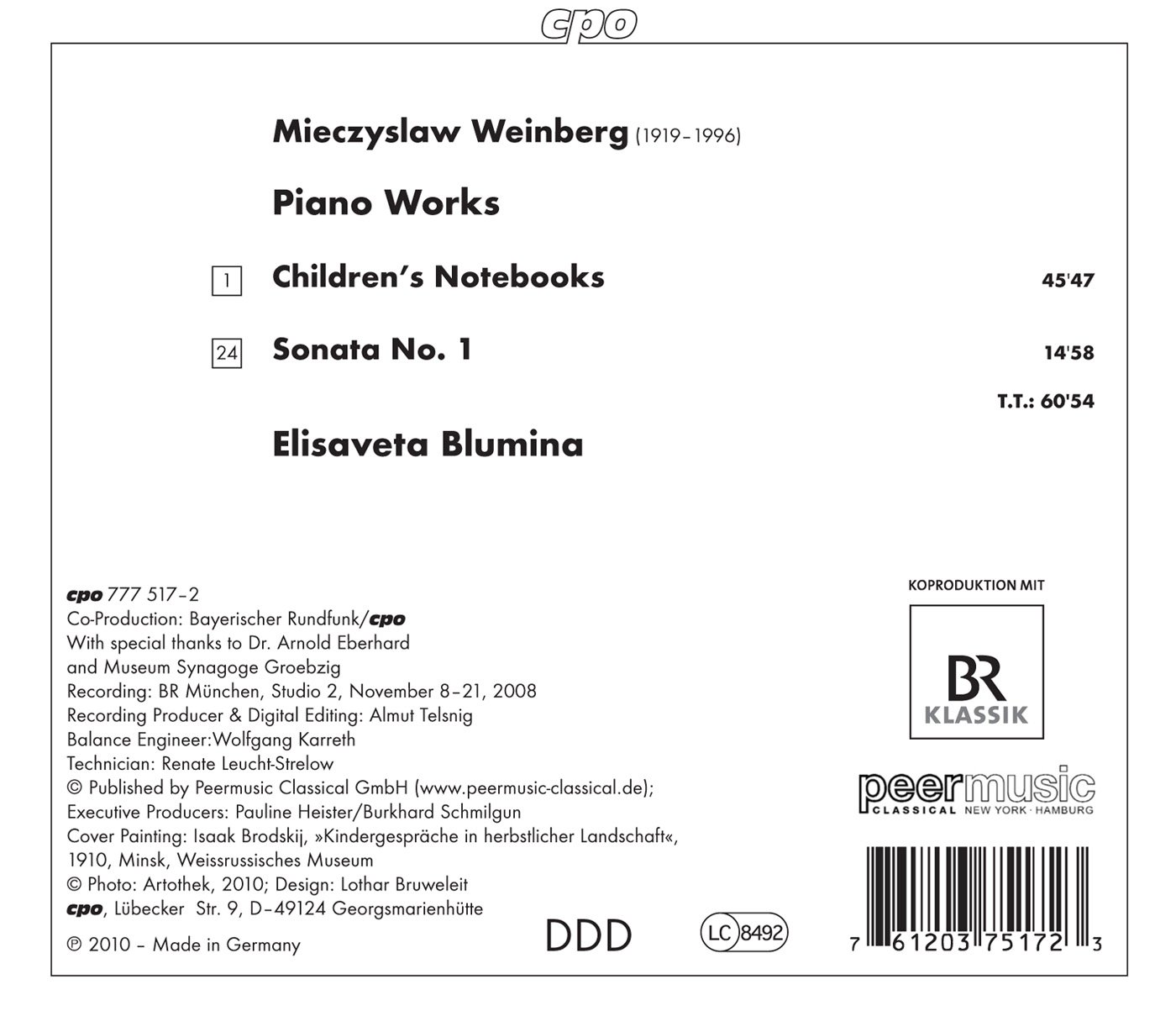
 "Die in Sankt Petersburg geborene und in der russischen Tradition aufgewachsene Elisaveta Blumina weiss gerade auch aus ihrer engagierten Arbeit mit Kindern die 24 Miniaturen der "Kinderhefte" genial umzusetzen. Klangschön ist ihr Ton, bestechend sind die musikalisch-charakteristischen Aussagen. Bereits 1940 komponierte Weinberg seine 1.Klaviersonate, die eine immense kompositorische Reife zeigt und hier in einer grandiosen Dramatik von Blumina umgesetzt wird." Carsten Dürer ("Piano News")
"Die in Sankt Petersburg geborene und in der russischen Tradition aufgewachsene Elisaveta Blumina weiss gerade auch aus ihrer engagierten Arbeit mit Kindern die 24 Miniaturen der "Kinderhefte" genial umzusetzen. Klangschön ist ihr Ton, bestechend sind die musikalisch-charakteristischen Aussagen. Bereits 1940 komponierte Weinberg seine 1.Klaviersonate, die eine immense kompositorische Reife zeigt und hier in einer grandiosen Dramatik von Blumina umgesetzt wird." Carsten Dürer ("Piano News")
"2011 could be breakthrough year for Weinberg, the composer closest to Shostakovich. Following the 2010 Bregenz and Warsaw success of his post-Auschwitz opera, The Passenger, there will be a first UK production for his Gogol opera, The Portrait. This record, by Dublin-based Elisaveta Blumina, starts a cycle of his piano music with two works from his 20s as a wartime refugee from Nazi-occupied Poland. Light as the kiddies’ pieces are, there is a melancholic tinge that Blumina draws out with great finesse; the sonata, dated 1940, is powered by fear and defiance. Strong stuff." Norman Lebrecht ("La Scena Musicale")
 "I hadn’t come across Elizaveta Blumina before but she’s yet another product of the continuing tradition of the Russian Piano School. Long may it continue for she approaches this music with great understanding and appreciation and it makes for a wonderfully illuminating experience." Steve Arloff ("Recordings of the months") (...read more)
"I hadn’t come across Elizaveta Blumina before but she’s yet another product of the continuing tradition of the Russian Piano School. Long may it continue for she approaches this music with great understanding and appreciation and it makes for a wonderfully illuminating experience." Steve Arloff ("Recordings of the months") (...read more)
"Weinbergs Kinderhefte: Diese Musik, ein Augenblick reiner Melodie, sucht zunächst nach Selbstvergewisserung, ihre Kindlichkeit erscheint ihr selbst fast als ein Wunder, und die Pianistin Elisaveta Blumina bringt dies auf eine ganz unsentimentale Weise heraus. Auch die folgenden Stücke des Kinderalbums sind nicht nur fröhlich sprudelnde Heiterkeit ... Elisaveta Blumina spielt die mit drei verschiedenen Opuszahlen versehenen Hefte wie einen grossen Zyklus." Martin Wilkening (FAZ)

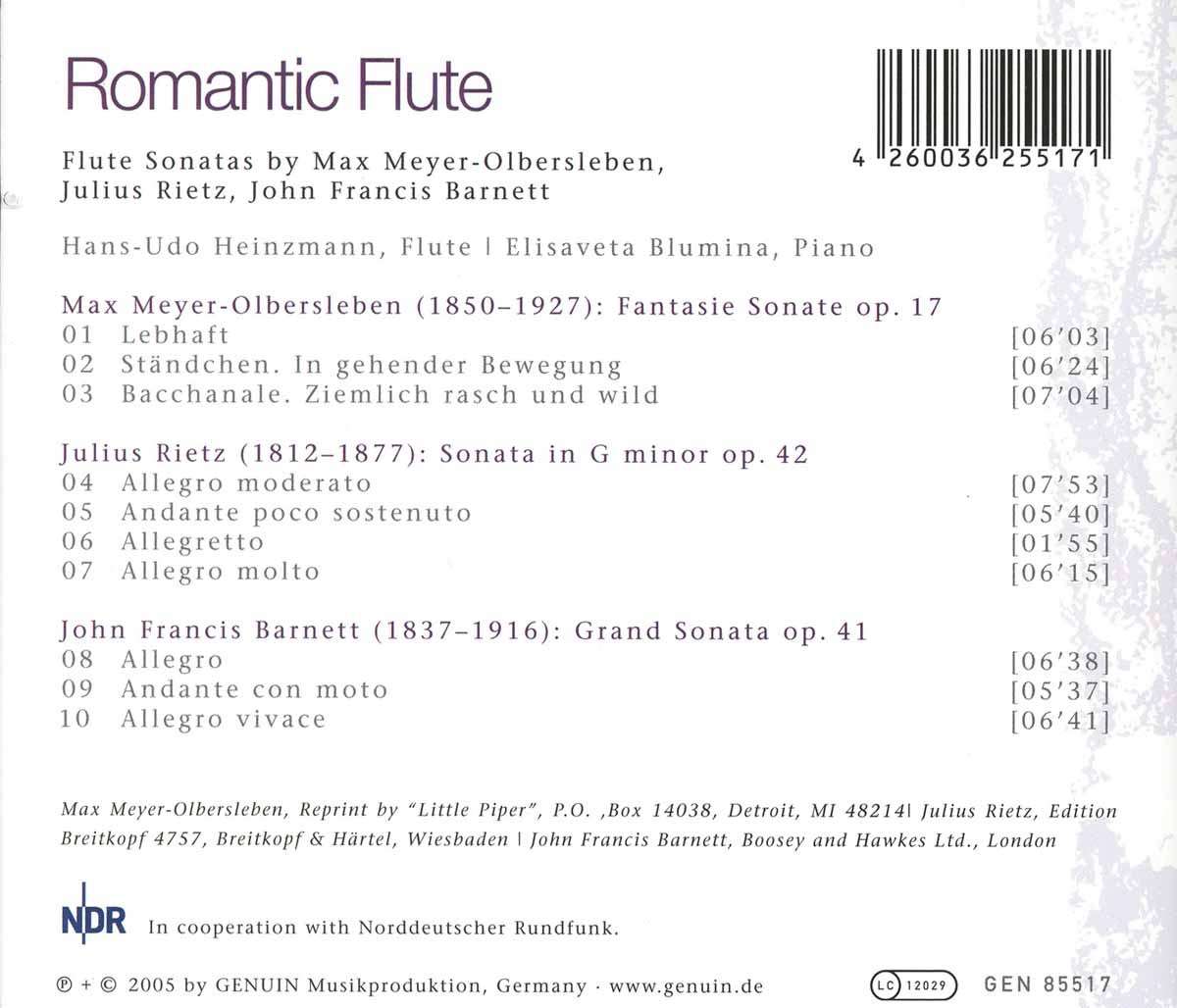
"The performances here by Hans-Udo Heinzmann (flute) and Elisaveta Blumina (piano) are truly inspired and technically world-class, transporting listeners to a world of dark forests and majestic heights, where your breath is taken away. Grab a collection of Mörike poems, pour a glass of red wine, lean back and press Play!" www.genuin.biz

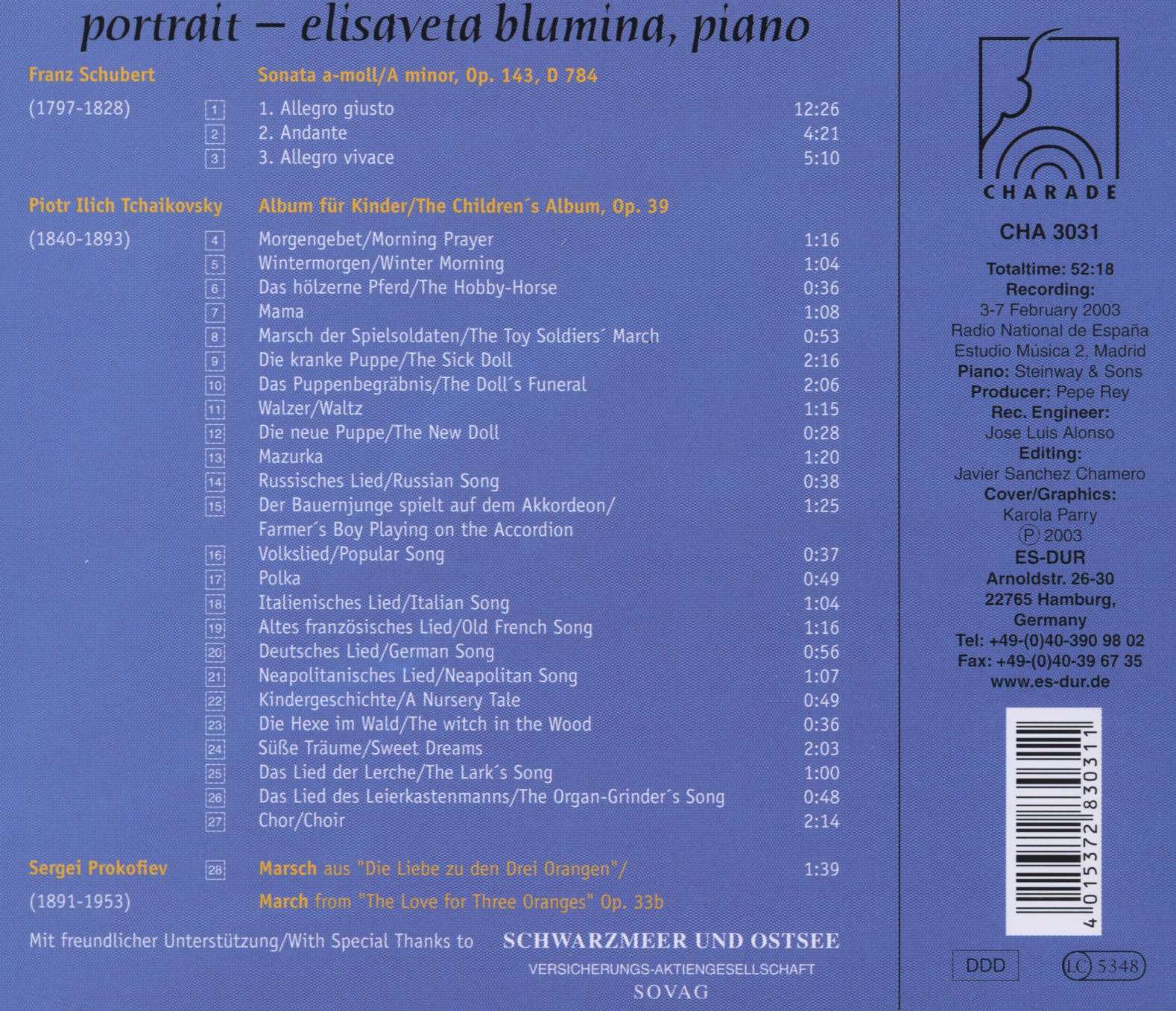
"Though the interpretation is certainly filled with passion, her clarity and control ... often allows the music to speak for itself, rather than calling attention to the player. It is a commendable performance." Stuart Isacoff ("Piano Today" New York)

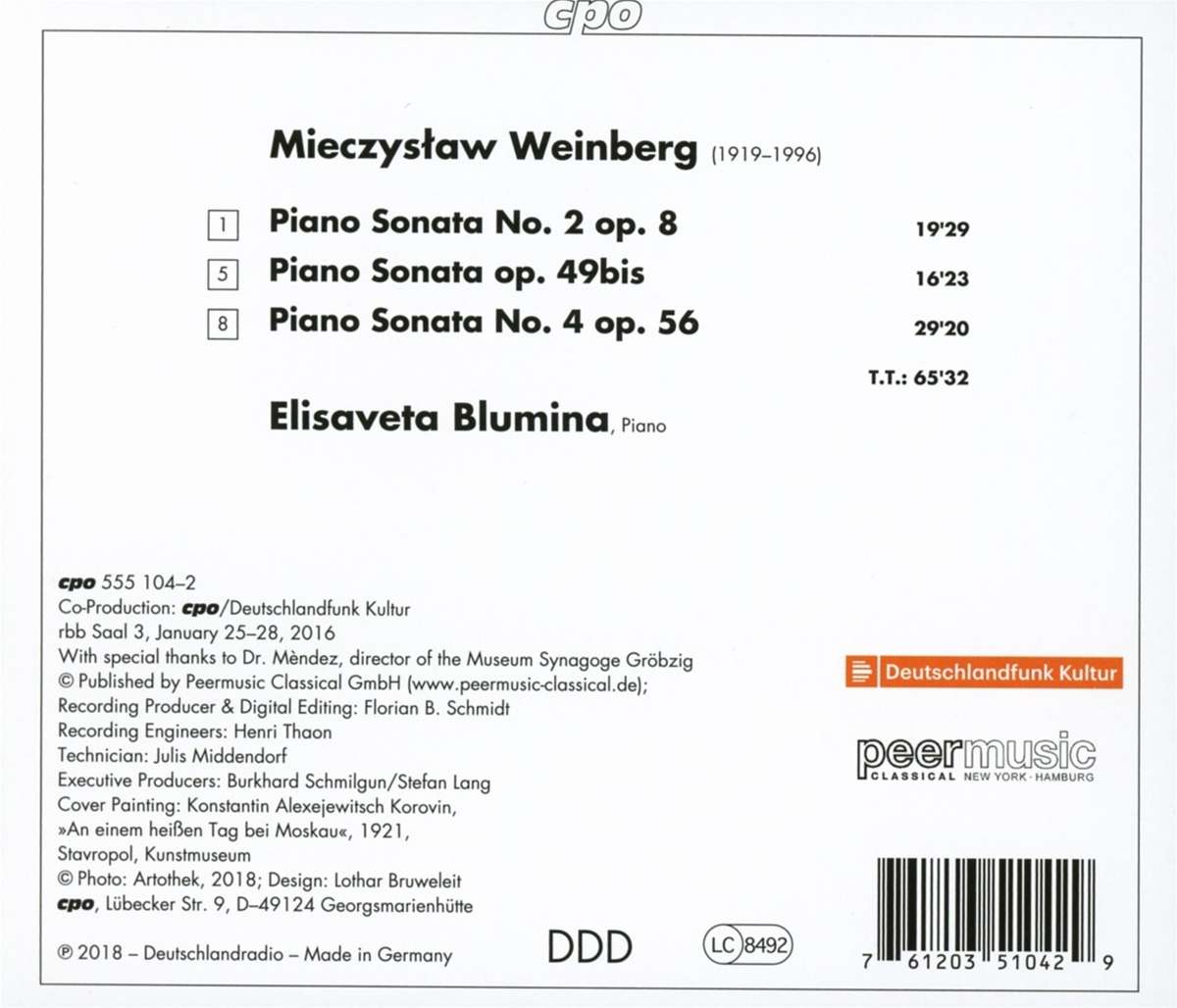
"Gilels recording (presumably), from 1957, is available on YouTube, and it is a full five minutes shorter than Blumina’s 30-minute reading here. By comparison, Gilels sounds rushed, especially in the first movement, although his tempos are supple, with plenty of restrained interludes. But Blumina’s interpretation is more convincing, not least for the directness of expression she achieves at her more measured tempos, as well as the clarity of texture and line. As in her previous Weinberg releases, the audio quality here is excellent—deriving from a co-production with Deutschlandfunk Kultur, the studio recordings made in January 2016. These aren’t the only recordings available of Weinberg’s piano sonatas, and as well as the Franzetti, there are also versions of Sonatas Nos. 2 and 4 from Murray Mclachlan on Divine Art. But, as the comparison with Gilels demonstrates, there are many ways to approach this music, and Blumina’s interpretations are convincing and compelling throughout."
Gavin Dixon ("New classical music releases reviewed in detail")

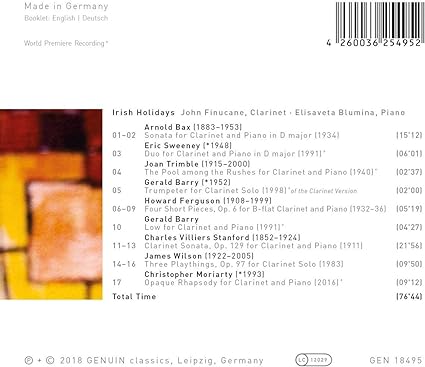
"Intimes Irland: Der Klarinettist John Finucane und die Pianistin Elisaveta Blumina tauchen in die musikalische Landschaft Irlands ein und locken mit mannigfaltigen und intimen Klängen." Lorenz Adamer, Klassik.com ...read more
"An engaging album, ranging from the geniality of Bax’s 1934 Sonata to Christopher Moriarty’s unsettling mysterious Opaque Rhapsody." (BBC "Music Magazine")

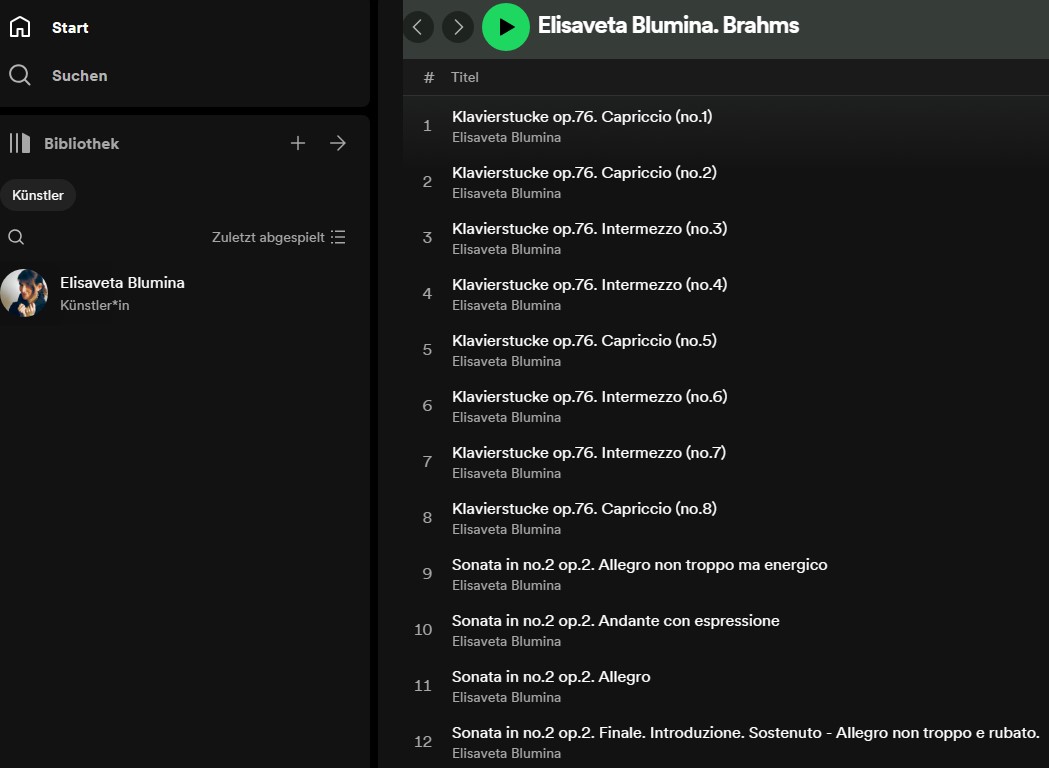
"Elisaveta Blumina is a natural Brahmsian, with a full-bodied tone and great technical flair. She invests this composer’s music with the robust spirit it requires, yet never sacrifices the clarity of his intricate architecture. By turns dramatic, playful, and poignantly lyrical, she strikes just the right balance of strength and sensitivity. Blumina knows how to coax from the piano the natural beauties of this deeply romantic classicist." Stuart Isacoff ("Piano Today", New York)


"Look Through"
Christoph Enzel (saxophon)
Elisaveta Blumina (paino)
Music for Saxophon and Piano
by: Glass, Pärt, Tüür, Schneider and Liebermann.
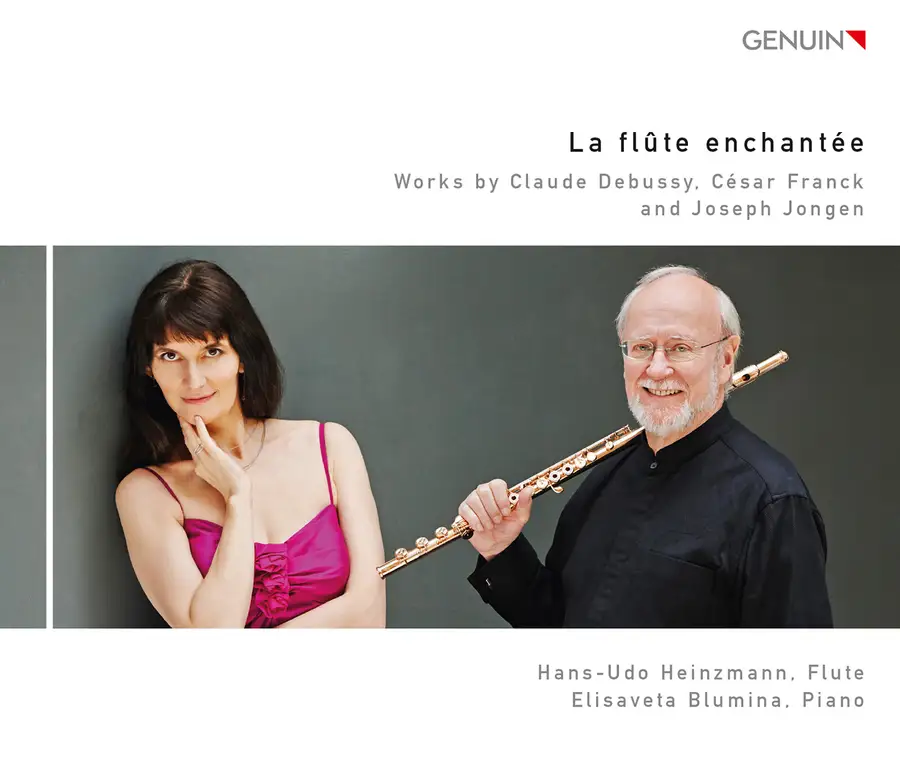
Jospeh Jongen (1873–1953)
Sonata for Flute and Piano, Op. 77
César Franck (1822–1890)
Sonata in A major for Flute and Piano
Claude Debussy (1862–1918)
Prélude à l'après-midi d'un faun
Hans-Udo Heinzmann Flute
Elisaveta Blumina Piano
2016 / Genuin
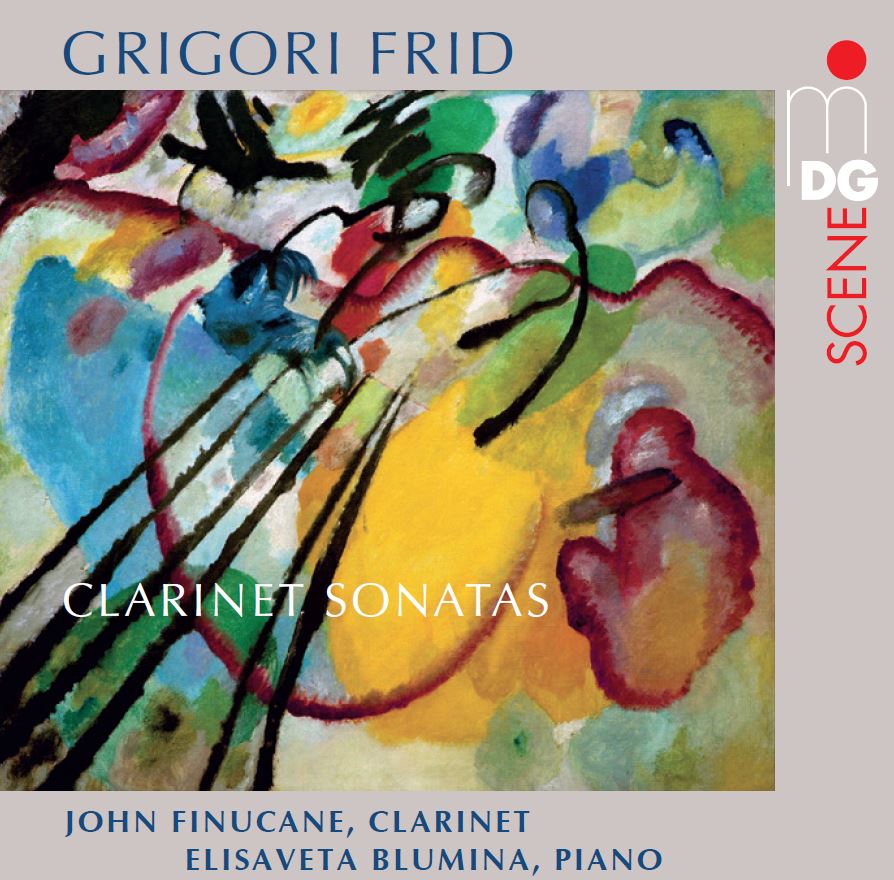
Grigori Frid:
Three Sonatas for Clarinet and Piano
John Finucane (clarinet)
Elisaveta Blumina (Piano)
Label: Musikproduktion Dabringhaus und Grimm
Hybrid SACD 2+2+2 Recording
 Elisaveta Blumina reveals the essence of Mieczyslaw Weinberg
"This marks the seventh recording of Mieczyslaw Weinberg’s music by Elisaveta Blumina. And, in my opinion, her performances remain just as true to Weinberg’s personality as they did in the first... Her playing is as mercurial as Weinberg’s music. In her hands, the piano can sound sarcastic, sentimental, angry, restless, or playful."
Elisaveta Blumina reveals the essence of Mieczyslaw Weinberg
"This marks the seventh recording of Mieczyslaw Weinberg’s music by Elisaveta Blumina. And, in my opinion, her performances remain just as true to Weinberg’s personality as they did in the first... Her playing is as mercurial as Weinberg’s music. In her hands, the piano can sound sarcastic, sentimental, angry, restless, or playful."
© 2020 Ralph Graves (wtju.fm) ...read more
 Well, I guess you’ve really “arrived” as a major composer when other people start making orchestral arrangements of your solo and chamber works.
"In this instance, it’s an orchestration of Mieczysław Weinberg’s Piano Quintet by one Mathias Baier. Of course, this work sounds just fine as a quintet, and all Baier really did was to expand the string quartet writing for a body of strings—no brass or winds—which effectively turned it into a sort of piano concerto. What really makes it work is the exceptional playing of pianist Elisaveta Blumina, whose work I have found to be quite good in other recordings, although the passionate playing of the Georgian Chamber Orchestra’s strings under the inspired conducting of Ruben Gazarian also helps a great deal."
Well, I guess you’ve really “arrived” as a major composer when other people start making orchestral arrangements of your solo and chamber works.
"In this instance, it’s an orchestration of Mieczysław Weinberg’s Piano Quintet by one Mathias Baier. Of course, this work sounds just fine as a quintet, and all Baier really did was to expand the string quartet writing for a body of strings—no brass or winds—which effectively turned it into a sort of piano concerto. What really makes it work is the exceptional playing of pianist Elisaveta Blumina, whose work I have found to be quite good in other recordings, although the passionate playing of the Georgian Chamber Orchestra’s strings under the inspired conducting of Ruben Gazarian also helps a great deal."
© 2020 Lynn René Bayley ...read more
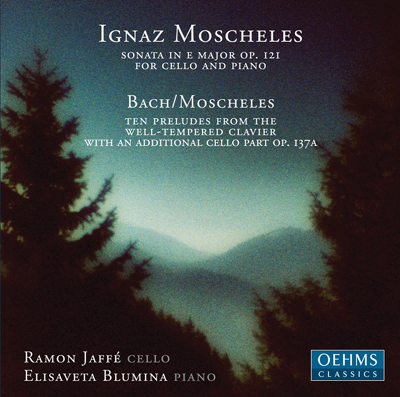
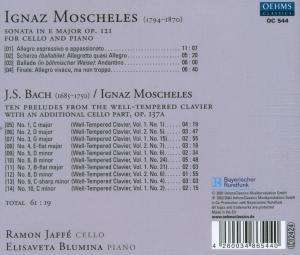
"Ramon Jaffé (Cello) und Elisaveta Blumina (Klavier) sind nicht nur für sich technisch herausragend, sondern allem Anschein nach auch bestens aufeinander eingestimmt. Und so legen sie in perfektem Zusammenspiel eine geschlossene und stimmige Interpretation vor. Elisaveta Blumina tupft die Begleitung in zartesten Farben hin. Die Balance der technisch astreinen, transparent und natürlich klingenden Aufnahme ist gelungen."
© Christian Vitalis ("klassik.com")
Visions fugitives, Op. 22
Peter Tchaikovsky
Dumka, Op. 59
Modest Mussorgsky
Pictures at an Exhibition
Elisaveta Blumina piano
1997 / Syrinx music & media
"The Prokofiev miniatures are played with a particular emphasis on empetuosity and lyricism. ...I wager that the world of music will be hearing a lot more from this gifted, accomplished young musician!"
Harris Goldsmith, "Piano Today", New York
![]() "I really prefer playing character pieces to all others. Maybe that is because, even as a child, I was very keen on ballet and my greatest wish in those days was to become a ballerina. Altthough this dream did not come true ("you're too tall", they said at the ballet school), my understanding of music was decisively mouldet by that early experience: through the idea of dance, movement and living figures I can get the music better.
Also, when choosing the repertoire for this CD, I was keenly aware that works of Mussorgsky, Prokofiew and Tschaikovsky represent a retrospective link to my home country. Paradoxically, musicians in Russia are more likely to learrn their performance skills from works by Austrian or German composers, growing up from childhood on a diet of Czerny's studies or sonatas by Mozart and Beethoven; all the same, this music in in my blood in avery natural and subtle way."
"I really prefer playing character pieces to all others. Maybe that is because, even as a child, I was very keen on ballet and my greatest wish in those days was to become a ballerina. Altthough this dream did not come true ("you're too tall", they said at the ballet school), my understanding of music was decisively mouldet by that early experience: through the idea of dance, movement and living figures I can get the music better.
Also, when choosing the repertoire for this CD, I was keenly aware that works of Mussorgsky, Prokofiew and Tschaikovsky represent a retrospective link to my home country. Paradoxically, musicians in Russia are more likely to learrn their performance skills from works by Austrian or German composers, growing up from childhood on a diet of Czerny's studies or sonatas by Mozart and Beethoven; all the same, this music in in my blood in avery natural and subtle way."
Elisaveta Blumina
![]() "Charakterstücke spiele ich eigentlich am liebsten. Es mag daher kommen, dass ich schon als Kind eine grosse Zuneigung zum Ballett entdeckte und mein sehnlichster Wunsch darin bestand, Ballerina zu werden. Dieser Traum hat sich nicht erfüllt ("du bist zu gross" hiess es an der Ballettschule), aber mein Musikverständnis wurde dadurch entscheidend geprägt: Durch die Vorstellung von Tanz, von Bewegung, von handelnden Figuren kann ich mich besser in die Musik einfühlen. Für die Repertoireauswahl auf dieser CD war auch ausschlaggebend, dass die Werke von Mussorgsky, Prokofjew und Tschaikowsky für mich eine rückschauende Verbindung zu meiner Heimat darstellen. Auch wenn paradoxerweise die Musiker in Russland eher auf der Grundlage österreichischer oder deutscher Komponisten ausgebildet werden und von Kindesbeinen an mit den Etüden von Czerny oder den Sonaten von Mozart und Beethoven heranwachsen, liegt mir diese Musik auf eine so natürliche wie subtile Art "im Blut".
"Charakterstücke spiele ich eigentlich am liebsten. Es mag daher kommen, dass ich schon als Kind eine grosse Zuneigung zum Ballett entdeckte und mein sehnlichster Wunsch darin bestand, Ballerina zu werden. Dieser Traum hat sich nicht erfüllt ("du bist zu gross" hiess es an der Ballettschule), aber mein Musikverständnis wurde dadurch entscheidend geprägt: Durch die Vorstellung von Tanz, von Bewegung, von handelnden Figuren kann ich mich besser in die Musik einfühlen. Für die Repertoireauswahl auf dieser CD war auch ausschlaggebend, dass die Werke von Mussorgsky, Prokofjew und Tschaikowsky für mich eine rückschauende Verbindung zu meiner Heimat darstellen. Auch wenn paradoxerweise die Musiker in Russland eher auf der Grundlage österreichischer oder deutscher Komponisten ausgebildet werden und von Kindesbeinen an mit den Etüden von Czerny oder den Sonaten von Mozart und Beethoven heranwachsen, liegt mir diese Musik auf eine so natürliche wie subtile Art "im Blut".
Elisaveta Blumina

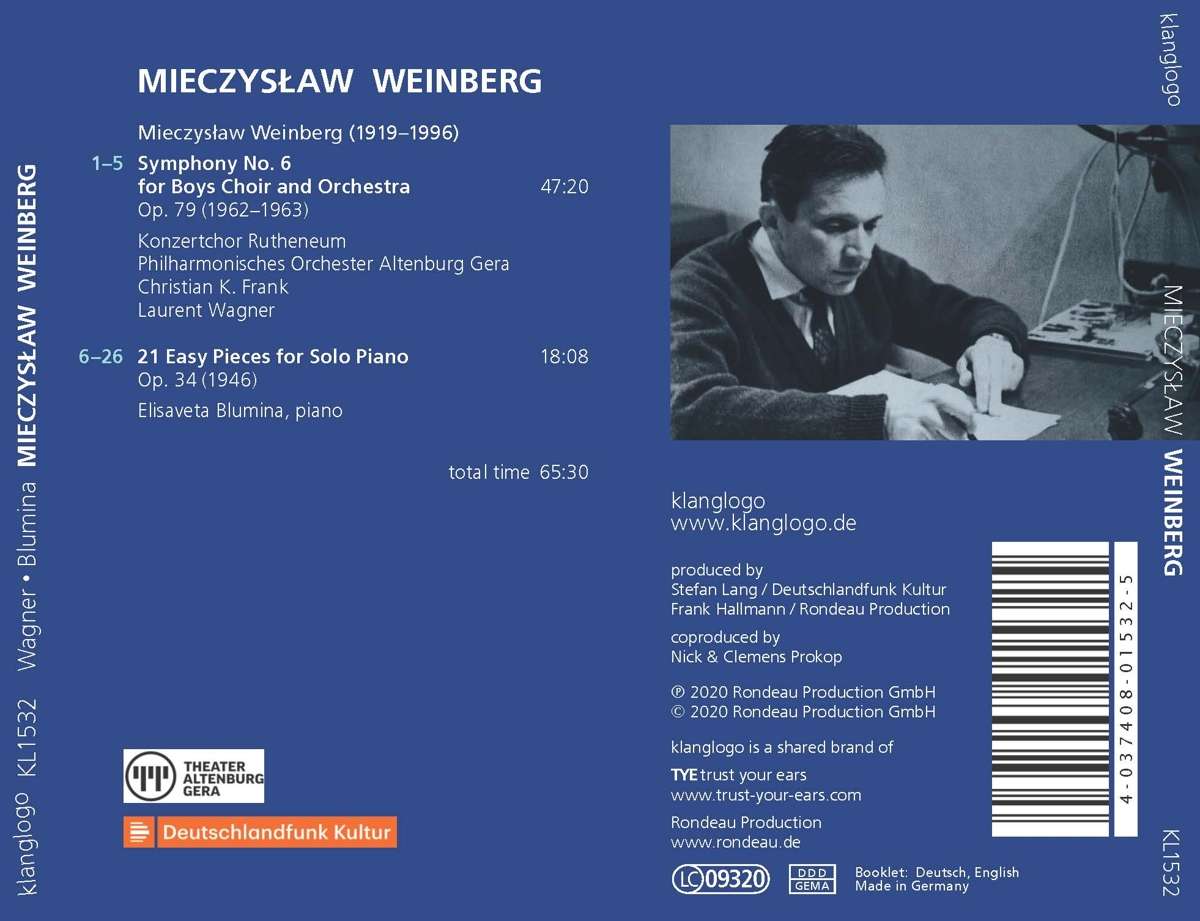
Sinfonie Nr.6 op.79
21 Easy Pieces for Solo Piano
Elisaveta Blumina, piano
Philharmonisches Orchester Altenburg/Gera
Konzertchor Rutheneum
Leitung: Laurent Wagner
Label: "klanglogo" 2020
Fazil Say (*1970):"Black Earth"
Alan Hovhaness (1911–2000): "To Hiroshige’s Cat"
Siobhán Cleary (*1970): "Chaconne"
LCMS, 2013
"...With such a mix of styles on display, it's maybe no surprise that not every piece strikes the right chord, but the hits are greater than the misses. Fazil Say's Black Earth resorts at times to clichéd neo-romantic sweeps but starts and ends evocatively by imitating the sound of the Turkish lute-like sax on muted piano strings. Elisaveta Blumina offers a more measured performance than Say's here, and also pulls off an excellent performance of a Chaconne by Siobhán Cleary..."© Pwyll ap Siôn / "gramophone"


Francis Poulenc: Sextuor pour piano, flute, hautbois, clarinette, basson et cor
Elisaveta Blumina, piano
Staatskapelle Berlin Woodwind Quintet
Live Recording 2010 / Staatskapelle Berlin


Klaviertrio Nr. 2, Op. 67
Aus jüdischer Volkspoesie, Op. 79
Arkadi Marasch, violin
Ramon Jaffé, cello
Elisaveta Blumina, piano
Katia Guedes, soprano
Ulrike Schneider, alto
Nils Giesecke, tenor
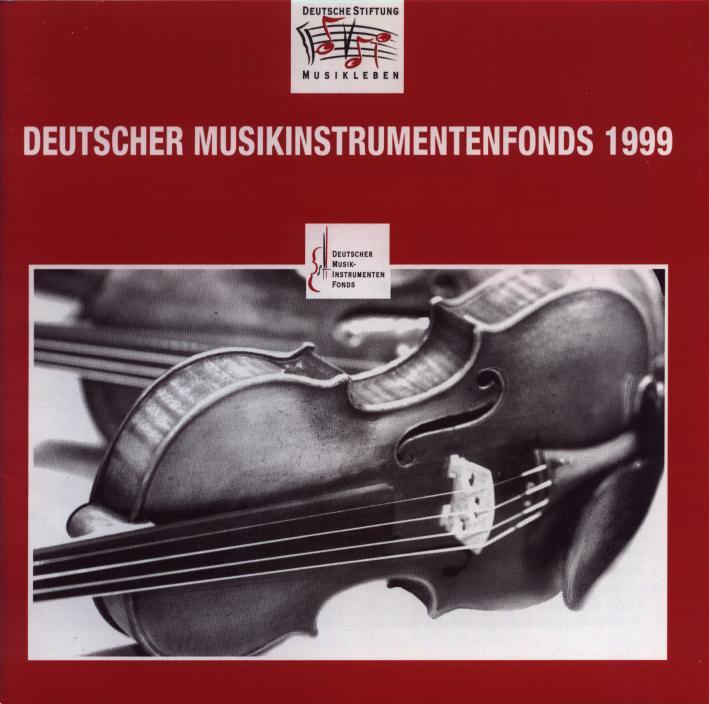
M. Ravel: Tzigane
C. Saint-Saëns / E. Ysaÿe: Caprice en forme de Valse
Antonia-Alexa Georgiew, violin
Marjolaine Locher, violin
Alina Pogostkin, violin
Elisaveta Blumina, piano
1999 / Bertelsmann
Camille Saint-Saëns: Sonata
Henry Dutilleux: Sarabande et Cortège
Gabriel Pierné: Solo de Concert
Alexandre Tansman: Sonatine
Marcel Mihalovici: Sonate
Roger Boutry: Interférences I
Gabor Meszaros, bassoon
Elisaveta Blumina, piano
2002 / discantica

Ernesto Halffter: Serenata a Dulcinea
Ernesto Halffter/H.Szering: Habanera
Ernesto Halffter: P.Manzo
Jose Luis Turina: Variaciones y Thema
Anton Garcia Abril: Sonata de Siena
Salvator Brotons: Sonata op.67
Sergej Teslia, violin
Elisaveta Blumina, piano
2005

S. Rachmaninov: Trio élégiaque G Minor
Reto Kuppel, violin
Martin Löhr, cello
Elisaveta Blumina, piano
1992, Hochschule für Musik und Theater Hamburg
- © Mathias Baier 2023 / background foto © Gunter Glücklich
